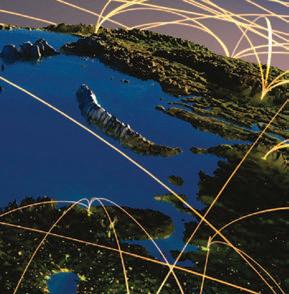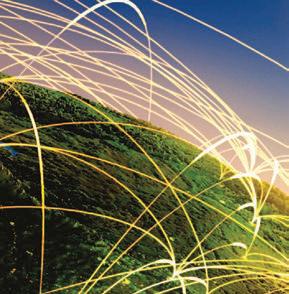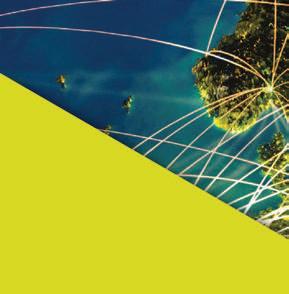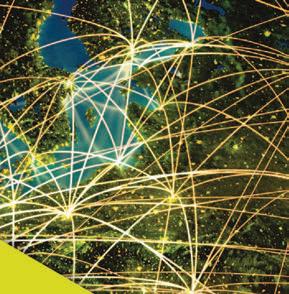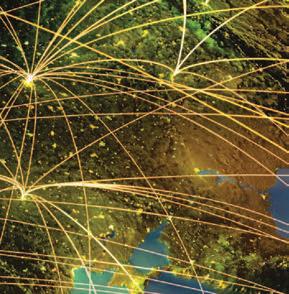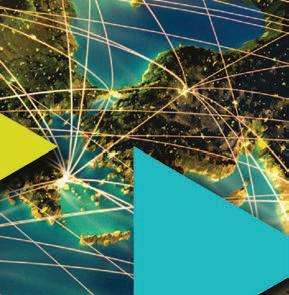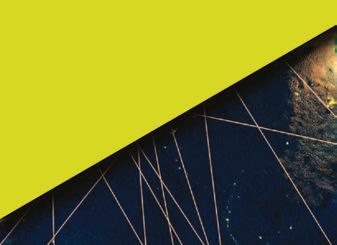THE WAY TO CARBON NEUTRALITY




SEE COMPILATION ON pages 22-25

HUNGARY SETS A COURSE TOWARDS NET ZERO TARGETS


Turkey celebrates its Republic Day on October 29. On this occasion, Diplomacy&Trade publishes a Turkish Focus on bilateral relations. The leading article of this compilation is a comprehensive interview with the Ambassador of the Republic of Turkey to Hungary, Ahmet Akif Oktay. He talks –among other issues – about the growing trade and investment relations between the two countries, especially in the field of energy as well as the wideranging cultural ties.

see compilation on pages 10-21
Cherishing an Ancient Sport




One of the international exhibitors at the World of Hunting and Nature Exhibition held in Budapest recently was the Saudi Falcons Club. Its CEO, Hussam Bin Abdulmohsen Al-Huzaimi talked to Diplomacy&Trade about the strong historical bond between humans and falcons, how falconry can be used as a tool of biodiversity and mentioning breeding centers in Europe, including Hungary. see article on page 26


YOU CAN SUBSCRIBE TO OUR NEWSLETTER








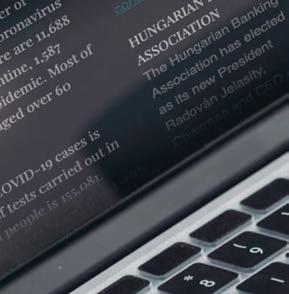

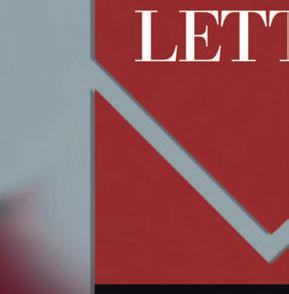



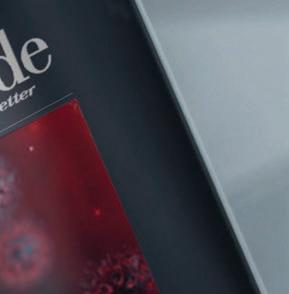
BY READING THIS QR CODE WITH YOUR SMARTPHONE AND FILL IN YOUR DETAILS





letter from the publisher
It is almost a daily occurrence that extreme weather conditions are reported from one corner of the world or another. Environmentalist groups have long been calling for measures to counter global warming and preserve a sustainable planet. The World Business Council for Sustainable Development has recently updated its Vision 2050 goals. Its director explains to Diplomacy&Trade why this was necessary and how the organization provides the business community with comprehensive, reliable and ambitious guidance. The country in focus this month is Turkey on the occasion of its October 29 Republic Day. In an extensive interview, the Turkish ambassador to Hungary, Ahmet Akif Oktay talks about the growing trade and investment relations between the two countries as well as the cultural ones, touches upon the issue of migration and his country’s relationship with the European Union. He stresses that all these fields hold out the prospect of ample opportunities for cooperation. Of course, The compilation also includes the presentation of companies that play the most important part in bilateral corporate relations. Before the announcement this September that Australia will acquire nuclearpowered submarines from the United States and the United Kingdom, not too many people may have been aware of a previous – and now canceled – deal in which France would have provided diesel-powered submarines to Australia. As our international analyst points out, there was outcry not only in France but also in China that now feels hindered in its sphere expansion plans as the new submarines appearing in the region could be a real match to future Chinese high-tech naval units.
The business page focuses on the ideas of the new boss at Roche Hungary as the Swiss healthcare solutions provider aims at creating a more efficient patient journey in this country. One of the exhibitors of the recent international hunting exhibition in Budapest was the Saudi Falcons Club. Its CEO explains to the readers how this ancient sport is cherished in his country.
This month, WittyLeaks is authored by the Argentinian ambassador who visited the southern Hungarian city of Pécs on the occasion that an almost a centurylong(!) ban on tango dancing was lifted there. While tango dancing found its way to Hungary, tens of thousands of Hungarians went the other way in the first half of the 20th century and now they and their descendants form an important migrant community in Argentina. Our culture page features this year’s edition of the ever-popular World Press Photo exhibition while the wine section is about Hungarian success in the final of the World Championship of Wine-Tasting. As Europe opens up from COVID-19 restrictions, we are seeing a dramatic increase in infections. Please, continue to follow safety guidelines socially as well as in the work environment.
Peter Freed PUBLISHER
cont en ts
26 FALCONRY
Cherishing an ancient sport
27 TRAVEL Grandhotel Lienz
28 WITTYLEAKS by the Ambassador of Argentina
29 WHAT’S ON Concerts, festivals, events and exhibitions in and out of Budapest
30 CULTURE
PUBLISHER: Peter Freed
EDITOR: Sándor Laczkó
PHOTO EDITOR: Dávid Harangozó
SALES & MARKETING DIRECTOR: Tamás Varga ADMINISTRATION: Éva Madarász

CONTRIBUTORS: Sándor Laczkó, Tamás Magyarics, Patiño Mayer
PHOTO CONTRIBUTORS: depositphotos.com (cover), facebook.com/karacsonygergely, europarl.europa.eu, mlsz.hu, depositphotos.com, facebook.com/variancom, Árpád Földházi, Roche Hungary, TURKCHAM, Türk Telekom, Danubio Budapest, Synergy Construction Hungary, KPMG, Shell, WBCSD, Grandhotel Lienz, Armin Zlöbl, Embassy of Argentina, Ministry of Foreign Affairs, International Trade and Worship, Argentina, László Tóth, Travis Shinn, Krisztina Friedrich, Live Nation, Museum of Applied Arts, Mads Nissen, Evelyn Hockstein, Ralph Pace, MTI Photos: György Varga, Attila Balázs, Dániel Kiss, István Filep, Tibor Illyés
Telekom; Çelebi; Synergy; Matild Palace; Gül Baba Türbe
22-25 CARBON NEUTRALITY
The Hungarian way to carbon neutrality; Shell; WBCSD
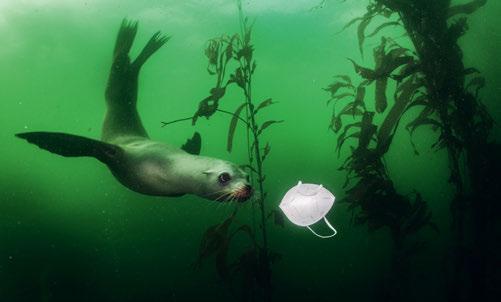
World Press Photo Exhibition
31 WINE
Hungary’s success at the World Wine-Tasting Championships
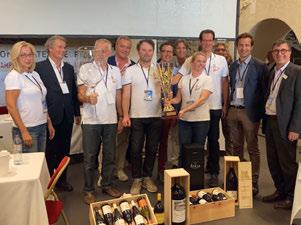
FRENCH FOCUS – COMING SOON

Diplomacy&Trade is going to present a special Focus section on relations between Hungary and the Republic of France on the occasion of France taking over the Presidency of the Council of the European Union in the first half of 2022. France is the 5th largest investor in Hungary. Just over 700 French-owned registered companies operate in the Hungarian market, employing more than 35,000 people. The leading article of the compilation will be an interview with the French ambassador to Hungary, Pascale Andréani about the main aspects of bilateral relations and also as allies within the European Union and NATO. We also present the activities of the 30-year-old French-Hungarian Chamber of Commerce and Industry (CCIFH) and several of the French ventures operating in Hungary.

on the record
AMBASSADORS' SCHOOL BY THE EUROPEAN PARLIAMENT
The Ambassador School program aims to raise awareness of Europe and European parliamentary democracy among young secondary school students. The program, launched in 2017, currently involves 49 secondary schools in Hungary and more than 2,000 schools across Europe.

STATE OF EMERGENCY EXTENDED IN HUNGARY YET AGAIN
Without parliamentary debate and with a majority of 112 votes in favor and 25 against, the Hungary’s ruling party Fidesz has once again extended the state of emergency and the emergency regulations, which will now last until January 1 next year.
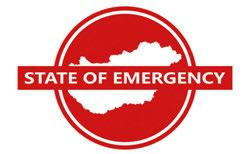
The government had previously claimed that it was necessary to extend the law because, as the coronavirus epidemic was still ongoing and the number of infected people in Hungary was increasing due to the delta variant, "in order to continue effective control and rapid response to the epidemic,".
According to the government, "the past year and a half has shown that the exceptional and transitional legal framework adopted earlier has served the control of the epidemic well".
At an early September government briefing, Prime Minister Viktor Orbán's chief of staff, Gergely Gulyás also claimed that the extension of the emergency "does not imply any restriction on freedom" and will not even affect the opposition primaries, because people can go to the polls in person.
The government has periodically extended the state of emergency during the epidemic, most recently in May. The opposition has already declined to vote for an extension on the last two occasions. In their view, the government has abused its power in this period, and they cited the example of the reorganization of universities into foundations, the news site telex.hu reports.
20 NEW MEMBERS OF THE V4 CAPITAL CITIES ASSOCIATION
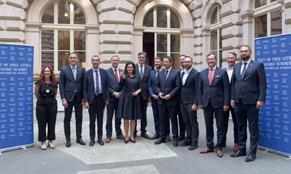
Taking place on the margins of the conference
‘Budapest Forum on Building Sustainable Democracies’, the Pact of Free Cities mayors' summit saw the alliance expanded with new members this September. The Pact is a global values-based alliance of cities, where city leaders work closely together to strengthen democracy and the rule of law, to promote progressive, sustainable urban policies and to take joint action against racism, homophobia, hate speech and all forms of exclusionary ideology.
The meeting was attended by 26 cities at mayoral level, in person, online or by video message. Some of the cities joining include Amsterdam, Vienna, Barcelona, Florence, Frankfurt, Gdansk, Ljubljana, London, Los Angeles, Paris, Stuttgart, Taipei and Zagreb.
The Pact of Free Cities is a progressive, open alliance, founded by the mayors of Budapest (Gergely Karácsony), Bratislava (Matúš Vallo), Warsaw (Rafal Trzaskowski) and Prague (Zdeněk Hřib) in December 2019 in Budapest. The objectives of the Alliance are to defend the values of liberal democracy, pluralism, openness and cultural diversity, to promote better access to EU funds and to exchange good urban practices and policies.
In order to expand the Ambassador School network in the 2021/22 school year, the EP Liaison Office in Hungary invited applications this September from secondary schools in Hungary to participate in the program. The aim for the Ambassador School network is to ensure the country's territorial coverage and to represent the diversity of institution types. To this end, this call for applications was mainly open to institutions in Nógrád, Bács-Kiskun, Tolna, Zala and Vas counties. This did not, however, exclude highquality entries from other areas.
Students and teachers participating in the European Parliament Ambassador School program will learn about the opportunities offered by European citizenship and the role of the European Parliament in the decision-making process.
In the first year, teachers who will lead the program in schools will undergo a 30-hour accredited teacher training course, which will familiarize them with the criteria of the program, the functioning and topicality of the European Parliament and help them with practical planning, methodology and organization of school programs.
STATUE OF THE IDENTITY CREDITED WITH INVENTING BITCOIN
The world's first bitcoin sculpture, created by Hungarians Réka Gergely and Tamás Gilly commemorates the founder of the bitcoin cryptocurrency and the blockchain technology behind it, Satoshi Nakamoto. The sculpture was unveiled this September at Graphisoft Park in Budapest.
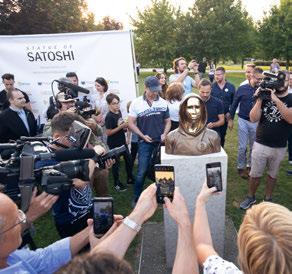
UPCOMING NATIONAL DAYS
October
1Cyprus National day
1China Independence day
1Nigeria Independence day
3Germany Independence day
3Korea National day
3Iraq National day
10Taiwan National day
10Cuba National day
12Spain National day
18Azerbaijan Independence day
23Hungary National day
24Zambia Independence day
26Austria National day
28Czech RepublicIndependence day
29Turkey National day
November
11Poland Independence day
11Angola Independence day
15Belgium National day
18Latvia Independence day
18Morocco National day
19Oman National day
22Lebanon Independence day
28Albania Independence day
The work of art honors the mysterious cryptocurrency creator Satoshi Nakamoto, a pseudonym for the Bitcoin inventor or inventors, whose identity is unknown. According to the sculpture's creator, András Györfi, it's not really Nakamoto's personality that's important. He believes that bitcoin has opened a new chapter in the history of the internet, creating new digital currencies and the blockchain technology behind bitcoin has made the world a better place.
The bronze bust was paid for by crowd-funding as the costs were covered by members of the national crypto community and individuals. The sculpture depicts a hooded figure without a face, a reference to both the mysterious Nakamoto and the people of the internet. The face of the sculpture has been heavily polished by the creators, so that anyone looking at it can see themselves.
HUNGARY SANCTIONED AFTER RACIST BEHAVIOR IN FOOTBALL
The Disciplinary Committee of the international football federation FIFA has imposed a ban and a substantial fine on the Hungarian Football Federation (MLSZ) in relation to the racist behavior of numerous supporters during the FIFA World Cup 2022 qualifying match between Hungary and England on September 2, 2021.

A statement by FIFA adds that after analyzing and taking into consideration all the circumstances of the case, specifically the seriousness of the incidents (racist words and actions, throwing of objects, lighting of fireworks, blocked stairways), the Committee decided that MLSZ would play its next two home matches in FIFA competitions without spectators, the second match being suspended for a probationary period of two years.
In addition, the Committee imposed a fine of CHF 200,000. FIFA’s position remains firm and resolute in rejecting any form of racism and violence as well as any other form of discrimination or abuse. FIFA takes a clear zero tolerance stance against such abhorrent behavior in football. The decision rendered by the FIFA Disciplinary Committee was notified to the MLSZ.
MLSZ has also issued a statement saying that it recognizes and supports the need to tackle racism, "but it is also clear that UEFA and FIFA disciplinary rules and decisions do not punish those truly responsible and are ineffective in their current form. In the meantime, the association will continue the process it has begun to keep out troublemakers and undesirable behavior. This will be facilitated by changes to the MLSZ's own practices and to the relevant legislation, which are being prepared. The MLSZ is awaiting the detailed reasons for the current decision and will appeal against the decision if justified," the Hungarian FA said.
company briefs
SIGNIFICANT DEVELOPMENT BY VARIAN IN HUNGARY

From December 1 this year, vaccination will be compulsory for all on-board staff on the low-cost airline's aircraft, but regular PCR and antigen tests will also be accepted in exceptional cases, Wizz Air said.
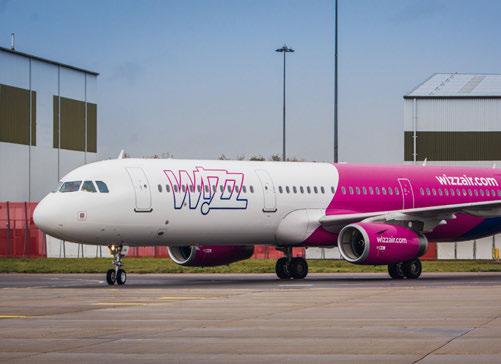
As the business news site napi.hu reports, in a spirit of corporate social responsibility, the airline is introducing the new rules to protect the health and safety of passengers and staff and to ensure the smooth operation of Wizz Air flights. Wizz Air's decision was based on research showing that vaccination is currently the most effective form of protection against coronavirus infection, the company explains the reason for making it compulsory for staff to be vaccinated.
As early as the outbreak of the pandemic, Wizz Air was already implementing strict health and safety measures to protect its passengers and staff, promoting physical distance and ensuring the most hygienic conditions possible. As the pandemic is still not over, Europe is one of the first countries to introduce the new rules. The aim is to achieve vaccination coverage at airline bases in accordance with local regulations, with the help of local authorities and health facilities.
METRANS TO BUILD CONTAINER TERMINAL AS LOGISTICS CENTER
The construction of the METRANS Group's container terminal – for which the laying of the foundation stone took place this September in Zalaegerszeg – will create a new logistics center in Hungary and increase the region's investment attractiveness. The cost of the southwestern Hungarian investment that promises to create 120 new jobs is close to HUF 16 billion, a quarter of which is covered by Hungarian taxpayers through a government decision.
As Péter Kiss, Chairman of the Executive Board of the METRANS Group highlighted, “there won’t just be a Metrans hub terminal in Zalaegerszeg – it will also be a central point for the entire European rail freight transport. Our investment shows how important Hungary is for the further development of the Metrans intermodal network.”
METRANS Group, which is engaged in intermodal freight transport as a subsidiary to the Germanybased HHLA (Hamburger Hafen und Logistik AG) concern, has been serving the transportation needs of various European countries with its railroad system and container terminal network. The company, with a staff of over 2,000 employees, offers efficient and environmentfriendly logistics solutions to its customers in Central and Eastern Europe, as part of the container freight transportation service provided in Europe's leading ports.
It was in 2017 that METRANS opened its first fully-owned Hungarian terminal in Budapest. Its international network, however, currently consists of 17 rail terminals. Zalaegerszeg has been selected for the site of the company's second terminal in the country, which is expected to grow into a significant hub in the future, on the transportation line connecting the ports of Southern and South Eastern Europe, namely Trieste, Koper and Rijeka with the European markets. The building of the terminal will support Hungary in becoming one of the most competent logistics centers in Europe.
Varian Medical Systems Hungary engaged in the medical technology sector has implemented a radiotherapy technological development in Hungary and expanded its Research and Development center in Budapest over the last three years. With the R&D project of a total cost of almost EUR 8.5 million, the company has created 30 new high value-added jobs. Hungarian taxpayers contribute to the investment costs with about EUR 1.5 million through a government decision. In addition to various other uses, the klystron instrument, patented in 1937 by the Americanbased Varian Medical Systems, has enabled the technological revolution of radiotherapy treatments, which are one of the cornerstones of oncotherapy, as well as the development of linear accelerating equipment, the Hungarian Investment Promotion Agency reports.
With over 10,000 employees worldwide, Varian has become one of the most prominent players in
the medical technology sector, and the equipment and systems developed and manufactured by the company provide daily treatment to millions of cancer patients around the world. The company now belongs to the German Siemens Group.
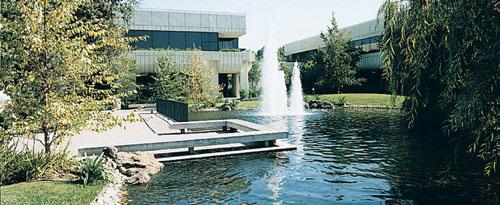
Varian established in 2012 in Budapest its first Eastern European office, which also has a dynamically growing research and development department. By the end of 2021, the company's headcount will be nearly 300, which is mainly due to the expansion of departments supporting development engineering and business processes. In the framework of the investment, Varian Medical Systems Hungary Ltd. has implemented radiotherapy technological development in the last three years. In Hungary, 11 out of the 13 radiotherapy centers apply Varian technology – prior to 2010, only one hospital had Varian instruments –, enabling the use of state-of-the-art oncotherapy technology in each center.
NEW PRODUCTION LINE AT THE UNILEVER PLANT IN NYÍRBÁTOR
The first phase of the expansion of Unilever Hungary Ltd.'s household chemicals plant in Nyírbátor, NE Hungary, representing an investment of EUR 50 million, has been completed, during which two new production lines and a packaging hall were built. As a result of the development, 100 new jobs will be created in addition to the existing 300 jobs in one of the most state-of-the-art, strategically important European production centers of the British-Dutch parent company.
Thanks to the development, the plant producing the Domestos, Cif and Flóraszept detergents as well as Surf and Omo laundry gels and Coccolino fabric conditioners will be expanded with a new packaging line and a modern warehouse in addition to the existing production lines.
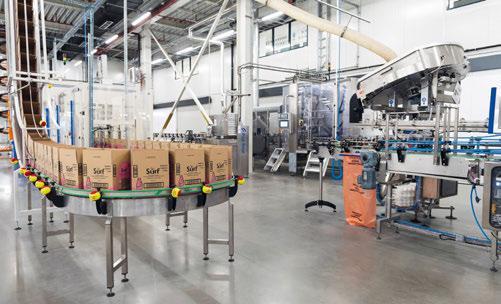
After the development completion, the plant will be able to produce 370 million bottles of products per year compared to the current 300 million. The bottles are made from 70% recycled plastic. The high-bay warehouse, which can accommodate nearly 14,000 pallets, will feature rail guided vehicles and automatic loading cranes.
Poland, Hungary and Germany are the plant's largest market outlets. With the current investment, 90% of Unilever's household chemical products sold in the Eastern European region will be produced here.
company briefs
NEW HANON SYSTEMS PLANT IN PÉCS

Hanon Systems, one of the world's largest automotive air conditioning suppliers, has set up a new plant in Pécs, S Hungary, as part of a greenfield investment. The new manufacturing facility increases production capacity for fluid transport products. The volume of the development is almost EUR 36 million, over 20% of which is borne by Hungarian taxpayers through a government decision.
The nearly 22,500-square-meter production hall provides space for automotive air conditioning production lines. The site offers the opportunity for further expansion to address future business needs and currently employs more than 300 people.
The South Korean corporate giant has a close relationship with Hungary and has been present in the country since 1991. It operates 51 manufacturing plants and three innovation centers worldwide, and its products are used by Ford, Audi, Volvo and Renault, among others.
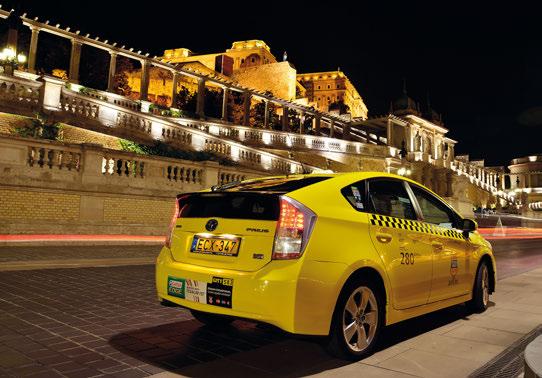
The new production unit in Pécs will accommodate the manufacturing of fluid transport products. Industry 4.0 solutions played a major role during the realization of the investment. The company carries out developments not only here, but also in other Hungarian venues like Rétság and Székesfehérvár.
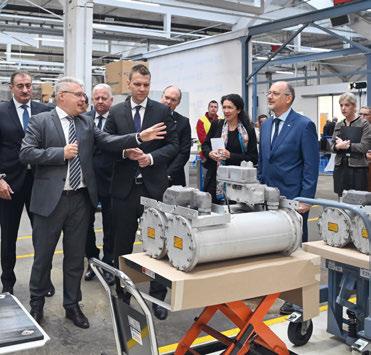
SCHAEFFLER SAVARIA E-MOBILITY COMPONENTS FACTORY

Schaeffler Savaria's second plant was handed over in Szombathely, W Hungary, this September, the Hungarian Investment Promotion Agency reports. The investment is a new facility realizing the development and production of powertrains for electric vehicles, built on a 30-hectare area, three kilometers from the old factory with a greenfield investment.
As the first electromobility plant of the Schaeffler Group, it was established in accordance with the highest standards for sustainable and energy-efficient production in the field of e-mobility. The development in the value of more than EUR 70 million will take place in a 15,000-square-meter production hall, creating 150 new jobs. Over 20% of the investment costs are covered by Hungarian taxpayers through a government decision. Thanks to this greenfield development, the company in Szombathely will become one of the largest production plants of Schaeffler in the world.
Following plant number one, which has been operating for 25 years, the new facility will be the first within the Schaeffler Group to produce purely electromobility products in accordance with the expectations of the world market. The plant is expected to produce 800,000 parts per year by 2023, and will reach its maximum capacity between 2026 and 2029, producing 1.8 million parts per year.
Aluminum and steel parts will be installed into the products of major car manufacturers.

The new factory was created in accordance with the highest Schaeffler standards, the requirements of sustainable and energy-efficient production, as well as the group's concept of 'The Factory of the Future', which includes green operation as an important element.
As a first step, the company will create about 150 jobs over the next five years in the new plant. The Szombathely site, which already consists of two plants and a research and development center, will employ a total of almost 3,500 people. Most of the staff working in the field of research and development and production processes, based on e-mobility, participate in multi-week training programs at the Schaeffler Academy in Germany.
NEW RAILWAY SERVICE CENTER BY KNORR-BREMSE IN BUDAPEST

The 8,000-square-meter new Railway Service Center of the world leading manufacturer of brake systems for railway and road vehicles, Knorr-Bremse Rail Vehicle Systems Hungária Kft., has been inaugurated in Budapest.
As a result of the investment, which includes on-site infrastructure and building development, as well as technology development, the range of the company's service competencies has also expanded. Thanks to the HUF 2.5 billion investment, 55 new jobs will be created.
Knorr-Bremse has a tradition of more than 110 years and today is present in 30 countries with more than 100 sites, providing employment for 27,000 people. The group achieved a sales revenue exceeding EUR 6 billion in 2020 and it is at the forefront of the development and production of state-of-the-art brake systems. This makes a major contribution to the safety of rail and road traffic.
The new Railway Service Center was fully financed from own resources with a total cost of 2.5 billion, is planned to serve more than 100 partners in many countries in Europe and certain parts of Asia through its partner factories. Thanks to the investment, which includes on-site infrastructure and building development, as well as technology development, the company's service competencies have also expanded. Thus, Knorr-Bremse can implement highquality, complex renovation projects in the future with competitive lead times. The two Hungarian units of Knorr-Bremse use the most advanced technology. Budapest is the center of the design and manufacture of railway brake systems, while the Kecskemét plant manufactures brake systems for commercial vehicles.
A ONE-TWO COMBO TO CHINA AND FRANCE?

WIDE-RANGING
BY TAMÁS MAGYARICSIMPLICATIONS OF THE US-UK-AUSTRALIA NUCLEAR SUBMARINE DEAL
The official announcement of an Australian-United Kingdom-United States (AUKUS) cooperation in providing nuclear-powered submarines to Australia on September 15, 2021 created instant furor in some countries, foremost among them in France, but – surprisingly – in Australia as well. In the case of the latter country, the problem was not the content of the deal, which pleased most of the people over there, but the casual remarks by President Biden, who referred to the Australian Premier as “that fellow Down Under” and as “pal,” did not go down that well. The American President’s gaffes are not really news by now, but the sort of condescension implied in the terms used with regard to Scott Morrison says a lot about the hubris in Washington – when they let their guard down.
The winners of the deal…
After the initial storm had quieted down a bit, a more detached and serious debate started about the short-, medium- and long-term implications, as well as the winners and losers of the security deal. As for the former group, at least in the short term, the U.K., and personally PM Boris Johnson seem to benefit from the agreement. One of the basic assumptions of, and argument for Brexit was that Britain would be able to act more freely in the international arena without having to coordinate with the EU countries. In short, the first step towards a promised ‘Global Britain’ has been taken, as London is committed to play a more prominent role in the security in the Asia-Pacific region.
The deal looks a bit of a mixed blessing for Australia. On one hand, its security will definitely be enhanced in hard military terms. On the other one, however, its relations with China, which has become arguably its single most important trading partner, are definitely affected negatively. It remains to be seen what countermeasures Beijing will take in the future to ‘punish’ Australia.
…and the losers
Among the losers – whether short-, mediumor long-term – France and, by extension, the Atlantic alliance can be mentioned. French Defense Minister Jean-Yves le Drian talked about ”a stab in the back” first. France lost a major arms deal, somewhere in the range of USD 55 billion, but the real loss was – and is –primarily political: a certain downgrading of Paris as a major ally for Washington. French pride is also deeply hurt: an estimated 1.5-2 million people live in French Pacific Dependencies, so Paris has some justification to claim to be a Pacific power, and thus get a fair share in the decisions affecting the area too. In reality, the French – and European – joy at the defeat of Donald Trump and the election of Joe Biden seems to be a tad premature and misplaced regarding the transatlantic cooperation. The Biden administration had not bothered itself with much consultation before pulling out of Afghanistan, and the creation of AUKUS was likewise coming out of the blue for the Europeans. The underlying message is clear: the new administration may be putting a thicker lay of sugar on the bitter pill, but it is not taking the Europeans as seriously as Washington used to a few decades ago. Of course, window-dressing
soon came when Secretary of State Antony Blinken visited Paris and had some good photo opportunities with a smiling President Emmanuel Macron. The French, in turn, concluded an arms sale with the Greeks in haste – which might be a not-so-subtle message to Turkey, whose major partner in matters like this is the U.S.
Containing China
Of course, China is in the center of attention. AUKUS is, to put it bluntly, another building block in the American strategy of containing China in the Asia-Pacific region. Though it is undiplomatic to use the ‘c’-word publicly, the reality cannot be hidden. The U.S. has a defense commitment to South Korea, Japan and Taiwan. Washington initiated the Quadrilateral Security Dialogue (QUAD) with Japan, India, and Australia in 2007. It cannot be too far from the mark to say that much of the intelligence activities of the ‘Five Eyes’ (U.S., U.K, Australia, Canada and New Zealand) is directed against China. The George W. Bush administration concluded a deal on nuclear technology cooperation with India. The Subic Bay Navy base and the Clark Air Force base are again used by the American armed forces. The U.S.-Vietnamese relations have been substantially improved lately. In short, U.S. military allies and countries surround China, which has started to throw around its military weight quite aggressively in the South China Sea and the East China Sea. On the technological side, China is busy developing and improving its blue water and power projection capabilities using state-of-art military technology; the French diesel-powered submarines may not be a real match to future Chinese high-tech naval units.
Reluctant Europeans
Beijing, at the same time, may benefit to some extent from the circumstances AUKUS was formed. The Americans and the Europeans were quarreling quite a lot over strategies to be adopted to China’s Belt and Road Initiative (BRI) and, in general, over policies to be pursued with regard to China’s rise during the Trump administration (think of the 5G network and Huawei). It was specifically Germany and France that had resisted American pressure to exclude Chinese technology, e.g., in the telecommunications and infrastructure sectors, while one of their major export markets was – and is – China. Previously, British PM Tony Blair, French President Jacques Chirac, and German Chancellor Gerhard Schröder had urged ending EU embargo on arms sales to China and granting that country ”market economy status” in the early 2000s. Therefore, they are reluctant to pick a fight with Beijing. The creation of AUKUS has sown new seeds of distrust between the Americans and the Europeans, and this might as well play into the hands of the Chinese who can take advantage of the situation with patient diplomacy and economic and trading incentives. So Round 1 has been won by the U.S., the U.K., and Australia. No one has been counted out yet, though. There may be someone who is groggy because of a one-two, another one, whose future chances to win in the Pacific region’s ring are somewhat shattered, but the judgment is out there yet as for the real winners and losers in this international game.
Tamás Magyarics is a foreign policy analyst
FOR A MORE EFFICIENT PATIENT JOURNEY
ROCHE WORKS TO ENSURE PEOPLE IN HUNGARY HAVE ACCESS TO HEALTHCARE SOLUTIONS THEY NEED
With almost two decades of experience in a wide range of areas across the Group, from diagnostics to pharmaceuticals and diabetes care, Raffaella Claudia Bondi, the newly appointed Managing Director of Roche Hungary, who has previously worked in Switzerland, Denmark and her native Italy, has arrived in Hungary. She sees the future in innovation and research and development, and believes that the continued uptake of personalized therapies is essential for value-based and sustainable healthcare.
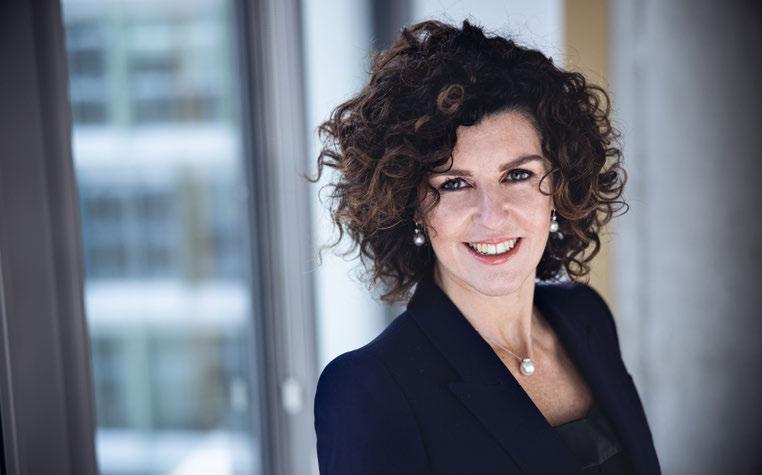
Roche has a diversified portfolio in Hungary. The pharmaceutical diagnostics and diabetes business lines and the Roche service center, which opened here 15 years ago, employ over a thousand people. As regards the main challenges that await her in managing Roche Hungary, Raffaella Bondi says that “we are present in a lot of different ways here in Hungary: as healthcare solution providers, innovators, investors and also employers. I think each of these roles presents opportunities and challenges, one them being to ensure that the people in Hungary can have access to the healthcare solutions we develop in a way that is appropriate to their needs. When I think about ourselves more as investors and think of our efforts in R&D, the question is rather ‘How do we collaborate and partner with the public stakeholders and universities, but also with the private ones, to innovate in healthcare in Hungary?’ And then, when it comes to our role as employers, the challenge is more like how to attract talent that can contribute to our success in Hungary and beyond as we work more and more in interconnected ways. So, we want our talents to be able to have an impact also beyond the geographical location.”
Personalized patient journey
According to the Managing Director, the continued uptake of personalized therapies is essential for value based and sustainable healthcare. “It is not only the base of our R&D globally, but it is also the way we look at the priorities in Hungary.” As an example in the company’s personalized healthcare vision, she mentions the patient journey management tools developed together with patients and healthcare professionals. “It is really about personalizing and making more efficient each patient journey so that not only the patient can have a better experience but the dialogue with the team of healthcare professionals is also much more efficient and effective.”
Aiming at developing a solution Roche is among the highest R&D spenders in this industry. Summarizing the main directions of research and development, Raffaella Bondi stresses that the top objective is personalized healthcare. “Personalized healthcare is about putting together advanced technology, medicines, data and digital innovation to develop something that is not just a piece of a puzzle, but it's really an integrated solution. So, when we look now
at our R&D, we really look at what the patient’s need is and how to address it in a holistic way. Thus, we don't just develop a single theme, but we aim at developing a solution, something that might have multiple components in order to be easily integrated into the patient journey.”
Joining the fight against the pandemic
Roche Hungary Ltd. has joined the fight against the coronavirus epidemic as a healthcare company, helping to control the situation with voluntary work and donations. As the Managing Director highlights, they have contributed in multiple ways “because we believe it's our role also as good citizens to contribute to easing such cases of emergency. We have donated our own products because some of these can be used in instances like this. But also, given that a large part of our employees are medical doctors, we have supported both vaccinations and activities in hospitals. Of course, following the indications of the government and innovation teams in the hospitals. Another
thing that I found, and it was done before I joined so I can’t take any merit for it but it was something I really appreciated: the donation of computers to children to support their distance learning, which is another way to really show our commitment to the general society.”
Three types of sustainability
Sustainability is a key word at Roche. As to how it appears in the day-to-day activities of the company, the Managing Director explains that “we talk about three different types of sustainability. The first one is at the core of what we do, which is innovating healthcare in a sustainable way – sustainable from a society perspective. It's about the work and the partnerships that we make with institutions and government to enable innovation at a sustainable cost for the society. It means working in terms of value based healthcare, reducing inefficiencies and making sure that the right patient gets the right treatment.” Another level of sustainability she mentions
as very important for Roche, and one that has been practiced for many years, is environmental sustainability. “Our company has taken a lot of initiative to reduce our impact on the environment. And in Hungary specifically, just think of our new offices: we chose on purpose a location which is well connected with public transport in a building, which is at the forefront in terms of reducing the impact on the environment. And then there is a third sustainability aspect, which is related to the idea of sustainability in terms of well-being – something that seems to be even more important in these times of the new coronavirus pandemic. We work in a hybrid way and this presents some challenges. So, as a company, as an employer, we offer ways to support our colleagues, and make available better conditions for remote and distant working in a way that can ensure their well-being.
COVID-19: adapting to the situation
In the fall of 2021, the world is still full of uncertainties, given the renewed spreading of the pandemic. Regarding Roche’s plan to cope with this situation professionally in the coming months and years, Raffaella Bondi stresses that they will continue as a company to invest in research and development related to COVID-19 both in the diagnostic field, where we were the first to develop a series of different diagnostic tools and we will continue to focus on that, but also on the treatment aspect. “We have multiple trials ongoing, and we will continue to invest in that area. And then more specifically, when it comes to the operations, it is all about ensuring our employees’ safety and well-being. Hybrid work can be sustainable if we think about it in an intentional way, focusing not only on ensuring business continuity but also on creating meaningful connections and effective collaboration, constantly looking at the evolution of the disease in order to adapt our measures and our ways of working.”
AMPLE OPPORTUNITIES for COOPERATION
 BY SÁNDOR LACZKÓ
BY SÁNDOR LACZKÓ
Ambassador Oktay began his tenure in Budapest in January 2018. In recalling the development of bilateral relations since then, he refers further back in time, to 2013. “Since that year, we have described our relationship as a strategic partnership. That was when we first established the intergovernmental mechanism attended by not just the leaders of the two countries, but also many government ministers. This way, we are able to take decisions at the highest level and then implement those decisions effectively. During my time in Budapest, we had the fourth round of the High-Level Strategic Cooperation Council meeting in 2019, with the next one scheduled for November 11 this year. But since 2018, of course, many other good things have also happened like registering good growth in bilateral economic ties. Despite the COVID-19 pandemic, our trade volume did not decline, but stayed at the same level,” he tells Diplomacy&Trade.
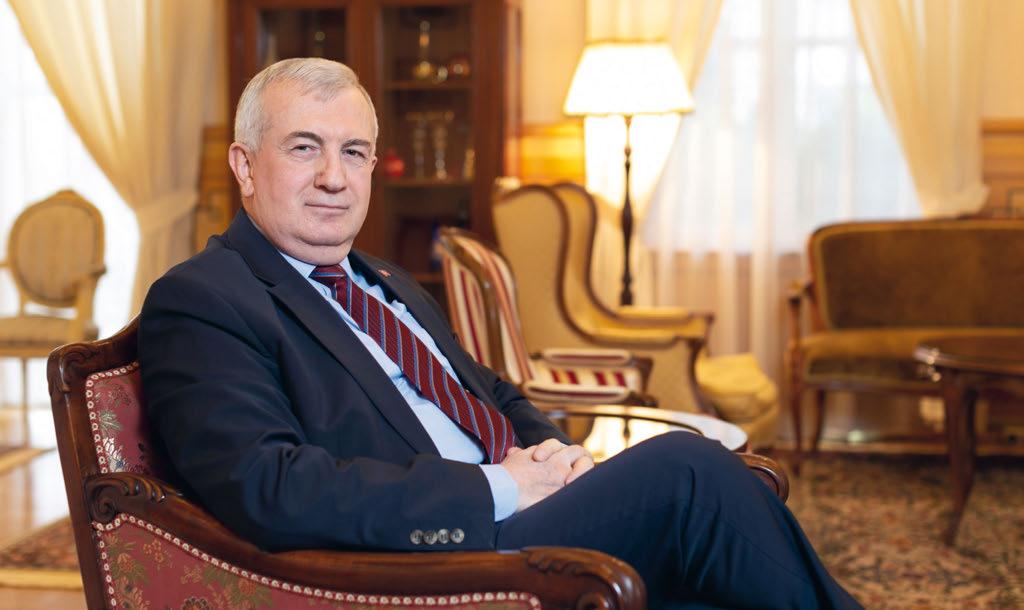
“Our president has paid two visits to Hungary since I took up my duties here. We also had a visit by the then speaker of our parliament who came to Budapest at the end of 2018 to celebrate the 95th anniversary of diplomatic relations between the two countries that began with the friendship
agreement signed in 1923, just after the Turkish Republic was established. Hungary was one of the first countries with whom we signed such an agreement. Of course, many ministerial visits also took place in the meantime. So, in my view, we have made good progress. I would have liked to see even faster progress, but unfortunately our tempo was somewhat slowed down last year by the COVID-19 pandemic that all countries suffered from diplomatically,” he adds.
Turkey and the EU

Hungary is a member state of the European Union.
As to how important this fact for Turkey is, the Ambassador reminds us that his country is a candidate for membership in the EU. “Unfortunately, now, the European Union has developed a new terminology. They are referring to the Western Balkans as a group of candidates for accession and Turkey is not included in this category. We want to be treated on an equal footing with the other candidate countries. We are, in fact, an accession country that has begun active membership negotiations and therefore, we are in the pipeline to join the Union one day. We supported Hungary after the communist period came to an end and Hungary became a democratic state. We supported Hungary's integration with Western institutions
like OECD and NATO, and now Hungary is returning the favor and they are supporting us within the EU.” Referring to the problem of migration from Asia to Europe – with Turkey located in between –Ambassador Oktay says “it is kind of an unresolved issue. In 2016, Turkey made a deal with the European Union, in which the EU said it would open new negotiation chapters with Turkey, they would provide visa free travel to Turkish citizens,
and customs union upgrade talks would start, etc. – unfortunately, none of these happened. The EU side promised to send us financial aid to help the refugees in Turkey where we have 4-5 million people, mostly refugees from Syria, but from other countries as well. As a result of this arrangement, the influx to Europe has radically decreased, maybe by 95%. However, from our perspective, this is a half-fulfilled deal. From the EU side, we are still
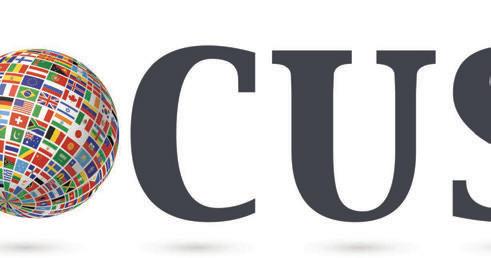
turkish focus

waiting for concrete steps on the aforementioned issues. EU leaders visited Turkey earlier this year, so these issues are being taken up at diplomatic talks.”
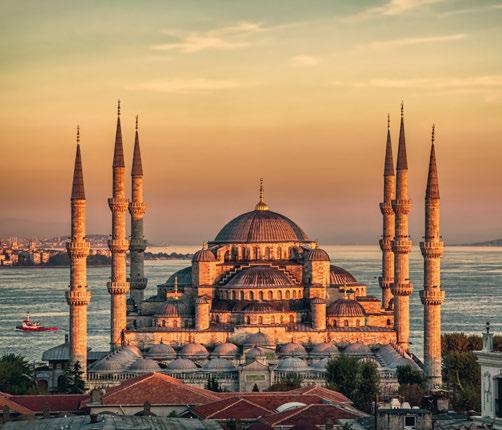
Economic relations making progress
Before the pandemic situation arose, the volume of bilateral trade had been on a constant trajectory of growth for 10-15 years. As the Ambassador highlights, “in 2018-19, the leaders of both governments set a new target: to double this growth rate and increase the annual volume to USD six billion. We haven't reached that target yet but we are making progress as we have the potential. This year, there are promising signs that our trade is getting back to its normal pace of growth, slowly but surely. However, when it comes to investments, it's a completely different picture. When you compare the situation between 2018 when I first came here and now – after more than three and a half years –, there is a tremendous growth of Turkish investments in Hungary. According to our calculations, the actual, physically realized investment volume is about USD 700 million and it is growing exponentially every year. We believe that in a few years’ time, it will increase to USD 2-2.5 billion, maybe even more, because there are mega projects in the works, which are either already being implemented or in the planning stage.”
The examples mentioned by the Ambassador include a Turkish company, which is establishing a rockwool factory to produce building insulation material in Miskolc. There is another Turkish investor establishing a factory for manufacturing cabins for tractors and similar agricultural machinery in Iváncsa, while the most recent example is the Şişecam glassware factory that establishes its first European glass-packaging facility in Kaposvár with a greenfield investment of EUR 220 million. “In terms of services, Turkish firms are also very active here – especially in the hospitality business. Others are busy building large housing projects and thus, thousands of housing units will be built by Turkish companies.
Other companies are working as subcontractors for, for instance, the Hungarian oil company MOL and others. Another example is the factory that BMW wants to establish in Debrecen Although the project is delayed, several Turkish companies are interested in working there as subcontractors. An additional opportunity for Turkish contracting firms is the large scale, but also delayed, expansion project of the Paks nuclear power station,” he adds.
Cooperation in the field of energy
Diversifying the energy supply is an important issue for Hungary. As to how Turkey can contribute to this goal, Ambassador Oktay says “we are already contributing as Turkstream II is about to become operational. Now, the construction of the pipeline, both on the Serbian side and the Hungarian side has been completed, and Hungary is supposed to begin receiving Russian gas through this pipeline very soon. The Turkish Petroleum Company and the Hungarian oil company MOL are also cooperating in different parts of the world on joint exploration projects. A major part of the Turkish companies’ portfolio in Hungary is in the energy sector. There is at least one large scale company, which wants to build an EUR 800 million solar energy farm in
Hungary. So, we are not just serving as a transit country for Hungary in importing oil and gas but we are also actively involved in energy projects in Hungary itself. In short, it's a very promising area and we can also work with Hungarian companies in Turkey, in the Middle East, in North Africa. The sky's the limit!”
Military partnership
Turkey and Hungary are both members of NATO and this partnership was also discussed by the visiting Turkish defense minister in February this year. As regards the main aspects of military cooperation between the two countries, the Ambassador explains that “for a long time now, we have been cooperating on the basis of NATO. We take part in joint military exercises, and we consult closely through our delegations in Brussels. We are happy about our alliance not just within NATO but on a bilateral level as well. Defense industry is emerging as a promising sector of cooperation. Last February, ten armored vehicles produced in Turkey were delivered to the Hungarian army, they are known as ‘Gidrán’ here. We have an agreement on the
procurement of defense material to Hungary, and the production will shift to Hungary as well.”
He also mentions a symbolic development showing bilateral military cooperation by which the ‘Turkish Stars’ aero acrobatic team of six planes flying in formation produced a performance at the Kecskemét military air show in Hungary earlier this year. “As the Hungarian government implements the Zrínyi 2026 Defense and Military Development Program, the Defense Ministry is buying equipment and establishing factories here for joint production as well with a number of countries. We are also ready to cooperate with Hungary in any way we can, including joint production here and the sharing of technology.”
Cultural ties
Ambassador Oktay stresses that good progress in bilateral relations has also been made in the cultural field. “One of the most important developments was the opening in Budapest – during the visit in 2018 of the Turkish President – of the Gül Baba Türbe (tomb). Cultural cooperation is maybe the richest area where we had the most visible progress during
the past three and a half years, and this was the most comprehensive restoration of the tomb site with both countries taking part in it. We are very happy about it but there are many other historyrelated projects waiting to be implemented.”
He highlights that Hungary and Turkey were allies during the First World War and Turkey sent about 30,000 soldiers altogether to fight alongside Austrian and Hungarian troops but only about 12,000 of them returned to Turkey. “So, many, many soldiers died along the frontline in Galicia and some of them also lost their lives in Hungary, in hospitals and other places. Therefore, we established here a Turkish martyrs cemetery, which, since 1926, has been managed by our embassy. On March 18, every year, we have a special commemoration ceremony for those 480 soldiers. But Hungarian soldiers also died defending Turkish soil, especially during the campaigns in the Gallipoli area where at least several hundred Hungarian soldiers fell fighting. To commemorate them, Hungary will establish a monument in the Gallipoli historical peninsula. The Hungarian minister of defense will be in Turkey hopefully sometime next year to inaugurate this monument.”
But there are projects in Hungary too. For instance, in Szigetvár, where Sultan ‘Suleiman the Magnificent’ died on his last campaign in Hungary and his remains were buried near the town center. That location was determined after many years of search and technical studies. Now, the Hungarian government wants to turn this site into a memorial center for visitors, “like maybe Gül Baba Türbe. As soon as the project is prepared and the Hungarian side informs us, we are ready to cooperate on that project as well. We can send material from Turkey to be displayed in the museum to be built for that purpose, and contribute financially to the project. So, it will be the next big step but, unfortunately, I may not see it because my tour of duty in Hungary is slowly coming to an end as our ambassadorial term is normally a four-year period. But the work will go on, I have no doubt about it,” he points out.
As for other cultural issues, there are about 830 Turkish students studying in Hungarian universities, and Hungary is providing 150 Hungaricum scholarships. The Ambassador believes this number may increase because there are many more applications to this program than the actual scholarships provided. “Of course, there have also been many, many other steps like the opening of the Turkish Maarif Foundation school in Budapest but one of the most important developments will take place in the year 2024, when we will celebrate the centenary of our diplomatic relations as the 1923 friendship agreement came into effect the following year (and the mutual embassies were also opened in 1924). To that end, we will designate 2024 as the Turkish-Hungarian cultural year, which has never happened before between the two countries. Throughout that year, both countries will promote their culture, history and social ties with more systematic activities in each other’s territory. During the upcoming intergovernmental meeting in November, we will sign a protocol on that, set up a working group and start the preparations. I'm sure it will be a very rich year. I'm also glad that the first step is being taken during my tenure in Hungary. I am sure that my successor will take the further concrete steps,” the Ambassador concludes.
turkish focus




The Hungarian-Turkish Business Association (Turkcham) was established by the five founding members in 1999, on the initiation of Turkish businessman Suat Karakuş who is now the President of the association. He tells Diplomacy&Trade about how much – and in what fields – the organization has been able to contribute to enhancing relations between Turkey and Hungary.




ENCOURAGING PARTNERSHIP IN ALL FIELDS
TURKCHAM FOCUS AREAS EVOLVE AROUND SUSTAINABILITY OF BUSINESS AND SOCIAL RESPONSIBILITY
“My goal was to create a platform where businessmen from both Hungary and Turkey can come together and help each other to develop their businesses further,” the President recalls. The Association has accepted many other Turkish and Hungarian members over the years, has supported a lot of companies on national and international level. “During this time, we have hosted delegations, NGOs, other chambers and businessmen visiting from Turkey, organized conferences, initiated bilateral meetings, taken delegations from Hungary to Turkey.
Turkcham has also pioneered in discussions about trade barriers, investment, economic and cultural relationships in both countries,” he adds.
Noting that the association recently celebrated its 20th anniversary, he highlights that “our role has been changing parallel to the challenges our business environment had faced during these years. We create an annual plan every year, in which we choose our focus areas, and they always evolve around sustainability of business and social responsibility.”
Accelerating investments
In the past few years, there have been several major Turkish investments realized in Hungary, especially on the real estate market in Budapest. Regarding Turkcham’s contribution to this development, Suat Karakuş explains that they provide tailormade consultancy for their members investing into any sector, including construction investment. “I believe that this field is one of the most challenging and resource-intensive
with the complex regulations, investment promotion options and with a very competitive market in Hungary. We pride ourselves not just in sharing our own experience within our members, but also in finding the required support through our international network, in order to accelerate the incoming and outbound investments further.”

He says it is hard to highlight just one of their many projects, but he is most proud of the Memorandum of Understanding between Turkcham, the Custom and Excise Service Providers Association of Hungary, and the Istanbul Customs Brokers Association, which they signed in October this year in Istanbul. “This ground-breaking cooperation agreement will provide the practical help to dismantle all the obstacles against the growth of bilateral trade between the two countries, for which our leaders targeted USD six billion to reach until 2023.”
Suat Karakuş, who is also Chairman of the DTİK (World Turkish Business Council) Regional Committee for Europe, stresses that he is generally very pleased that the number of international organizations Turkcham is cooperating with are continuously increasing, and not just in a bilateral context. “As an example, since 2020 we are in close partnership with the World Turkish Business Council, which expanded our network to Turkish businessmen all over the world and created the opportunity to cooperate in a more comprehensive level.”
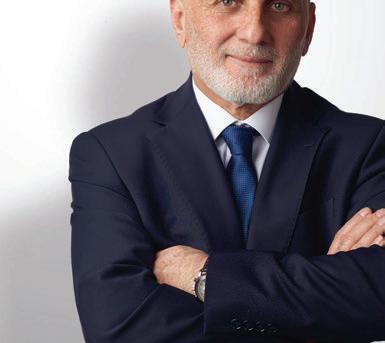
Sustainable relations
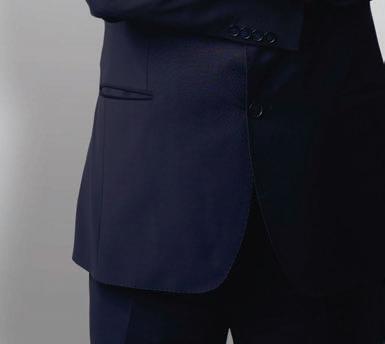
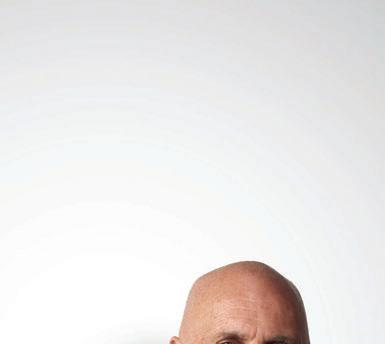
In his presidential address to those interested in the activities of Turkcham, he describes a plan to focus on sustainable development in bilateral relations. “I believe that in order to achieve a long-term growth within the relations of Hungary and Turkey, we need to integrate as many fields as possible, within and outside of the business environment. Our social responsibility agenda is focusing on environment related projects, starting from local community level like tree planting, to more integrated level as making freight forwarding between Turkey and Hungary greener. One of our cultural programs is a poetry competition we will announce for both Hungarian and Turkish children. In education and sports, we plan to find cooperation partners in the future – as one of our new points on the agenda – to support the group of the disadvantaged children from both countries,” he explains. Social responsibility has been a key target
of Turkcham during the covid pandemic as well. To Turkcham’s initiation, the TurkishHungarian Business Council of DEIK, the Foreign Economic Relations Board of Turkey sent a sanitary aid convoy to Hungary in spring 2020, as a sign of friendship between the two countries. With the financial contribution of dominant Turkish companies, the threetruck convoy included medical equipment consisting of face shields, medical hand sanitizers and special high-alcohol scented hand sanitizers manufactured in Turkey. The President believes that Turkcham encouraging partnership in all fields, from business to social life, from children to adults while addressing the current issues of the world, is the right way to create sustainability and long-term commitments from both sides.
Important partners
One of Turkcham’s priorities is to communicate and cooperate with local chambers, associations and related institutions. Suat Karakuş points out that Turkcham has a diverse partner network in Hungary, with historical ties dating back many years. “It is mostly because our founding members, including myself, have been doing business in Hungary for more than 20 years.” In the field of export development, the Hungarian Export Promotion Agency (HEPA) has been a partner organizing conferences and B2B events together. “From customs and trade points of view our strongest ally is the Custom and Excise Service Providers Association of Hungary. Together, we organized the first Turkish-Hungarian Customs Conference in Hungary in 2019, which took place in the Hungarian Tax Authorities’ building. This conference created the groundwork of the memorandum we have just signed last month. Among many others, I would also like to highlight our close relationship with the Turkish Embassy in Budapest, the Hungarian Embassy in Ankara, the Hungarian consulate in Istanbul and its trade attachés –it is also an important forum in reaching the aforementioned USD six billion bilateral trade goal between Hungary and Turkey,” he adds.
A beam of hope
The end of 2021 is drawing near and hopefully, the end of the pandemic too. The Turkcham President is optimistic. “Recently, due to the pandemic, many of our international events have turned to online platforms. We hope that in the next year, we can return to live events, which would allow us to complete our yearly agenda and put our new objectives in practice. We would like to reach and connect with our community more with the tools of the digital era we are living in. For this reason, we redesigned our website, and made our quarterly business magazine available online as well. We are also dedicated to continue creating more platform for our members in order to cooperate at an international level and address their current trade obstacles. I hope we can organize our 20th anniversary celebration dinner, which has been long delayed at the beginning of 2022. This event would bring us back together as a beam of hope after the trying times hopefully behind us.”
HOTELS THAT DEFINE THE DESTINATION ™

As one of the most iconic buildings in Budapest, the hotel boasts a highly distinctive ambience representative of its Hungarian heritage, which runs beautifully through its core and is unmistakable from the moment guests step foot through the front doors.

turkish focus
Türk Telekom International (TTI) is a leading telecommunication operator in the CEE region, Turkey, Caucasus, MiddleEast and Asia. It provides a full range of Internet/data services, infrastructure and wholesale voice services to incumbents, alternative carriers, mobile operators, cable TV companies, Internet service providers and corporate customers. Diplomacy&Trade talked to Türk Telekom International Group CEO, Şükrü Kutlu about TTI’s infrastructure and operations in Hungary and elsewhere in East Central Europe.
Türk Telekom International has vast experience in providing a wide variety of telecommunication services. As to what it means for the Group’s Hungarian subsidiary, Türk Telekom International Hu Ltd., and its clients that it belongs to such a wide international network, the CEO pointed out that the company is a leading regional operator in the fields of international data, fiber infrastructure, international wholesale voice communication and mobile roaming through its subsidiaries located in 17 countries and with its headquarters in Budapest.
“This unique geographical positioning at the crossroads of Europe, the Middle East, and Asia data traffic is one of TTI’s main advantages in the market. TTI reinforces this critical advantage with its state-of-the-art network,” Şükrü Kutlu said.

TTI has a terrestrial fiber optic network of approximately 45,000 kms and more than 100 PoPs across 22 countries. It has access to three submarine cable systems: the SEA-ME-WE-5 submarine fiber optic cable consortium connecting Europe to Asia; MedTurk connecting Turkey, Middle East, and Europe; and KAFOS (Black Sea Fiber Optic System) opening from Black Sea to Europe. The CEO added that TTI is also an important regional player in the field of wholesale voice and SMS transport and international mobile roaming and is constantly increasing its activity in emerging markets such as Africa, the Far East and Latin America.
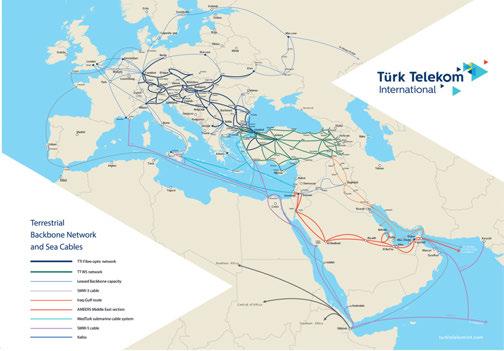
“TTI’s unique geographical positioning, state-of-theart network connecting Europe and Asia, diversified product portfolio, and experienced data and voice teams are our key strengths that make us stay a step ahead of our competitors and are also main values we are offering to our clients,” he explained.
Connecting the region
Türk Telekom International has a major presence on the East Central European market, not just in Hungary. Regarding plans for the upcoming years, CEO Şükrü Kutlu stressed that part of TTI’s vision is to continue expanding its infrastructure and provide alternative, high quality, high capacity and low-cost routes to its customers. “As a result of this vision and despite all the challenges presented by the global pandemic, TTI successfully completed two major investment projects in the last year.”
One of these major investment projects is the
CONNECTING THE REGION
TÜRK TELEKOM INTERNATIONAL HAS A MAJOR PRESENCE ON THE EAST CENTRAL EUROPEAN MARKET
TTI New Backbone, connecting Sofia, Budapest, and Vienna through two different protected routes in Europe with endpoints in Edirne, Turkey and Frankfurt, Germany – each with a fiber network of over 3,400 kms. “The new backbone provides high speed and quality service to our customers at more affordable prices,” he said. The second project is the integration – to TTI’s network – of KAFOS, which is a subsea telecommunications cable system that spans through the Black Sea connecting Romania, Bulgaria and Turkey, and providing seamless connectivity between Turkey and Europe. In addition to these, very recently, TTI, in cooperation with several leading regional operators, initiated the ambitious The Alternative Middle East Europe Route-2 (AMEER2) project, which will be built as a 7,550-km-long high-capacity fiber-optic cable system – with terrestrial and submarine segments – connecting Bahrain, UAE, KSA and Jordan to Europe via the Mediterranean Sea and Turkey. The state-of-the-art cable will provide the shortest path possible from the Middle East to Europe in a cost-effective manner, he added.
Growth story possible
Over the past few months, Türk Telekom International has often emphasized in its statements that it is happy to be back physically at international events. Talking about the challenges pandemic restrictions have posed in TTI’s business, the CEO highlighted that TTI’s staff is present in different cities from Vienna to Moscow. “Due to the pandemic, physical communication between TTI staff was not possible for a while. However, TTI’s digital infrastructure enabled our operations and communication to continue seamlessly.” On the other side, with the pandemic, the importance of digitalization is even more accentuated. There was a sharp increase in demand and this trend is expected to continue in the future. Changing consumer trends, such as social media usage, online streaming and remote working contributes to the tremendous traffic growth.
“Within this context, the quality, speed, continuity and latency of the internet connection has become more significant than before. As a result, competition is tougher. In this competitive environment, it is apparent that supplying core data and voice services alone is not enough to grow your business. Having a growth story is possible through exploring services beyond core areas. Value added enterprise services become indispensable to meet both customer expectations and company growth,” he stated. This new challenge also forces TTI to go beyond the core business of international capacity transport and add value to its infrastructure with new services that can meet the needs of the current telecom landscape.
“TTI’s versatile IP product portfolio is designed to this end. Major global cloud and content providers have already commenced operations in Istanbul via TTI’s IP products and robust network capabilities such as four diverse fiber routes from Western Europe into the main datacenters in Istanbul. In addition to that, TTI is always looking to expand its partner ecosystem and provide new services that enterprise customers demand. TTI’s managed SD-WAN service, Global MTN and TTI Cloud Connect Service are some examples of TTI’s corporate services,” Türk Telekom International Group CEO, Şükrü Kutlu concluded.
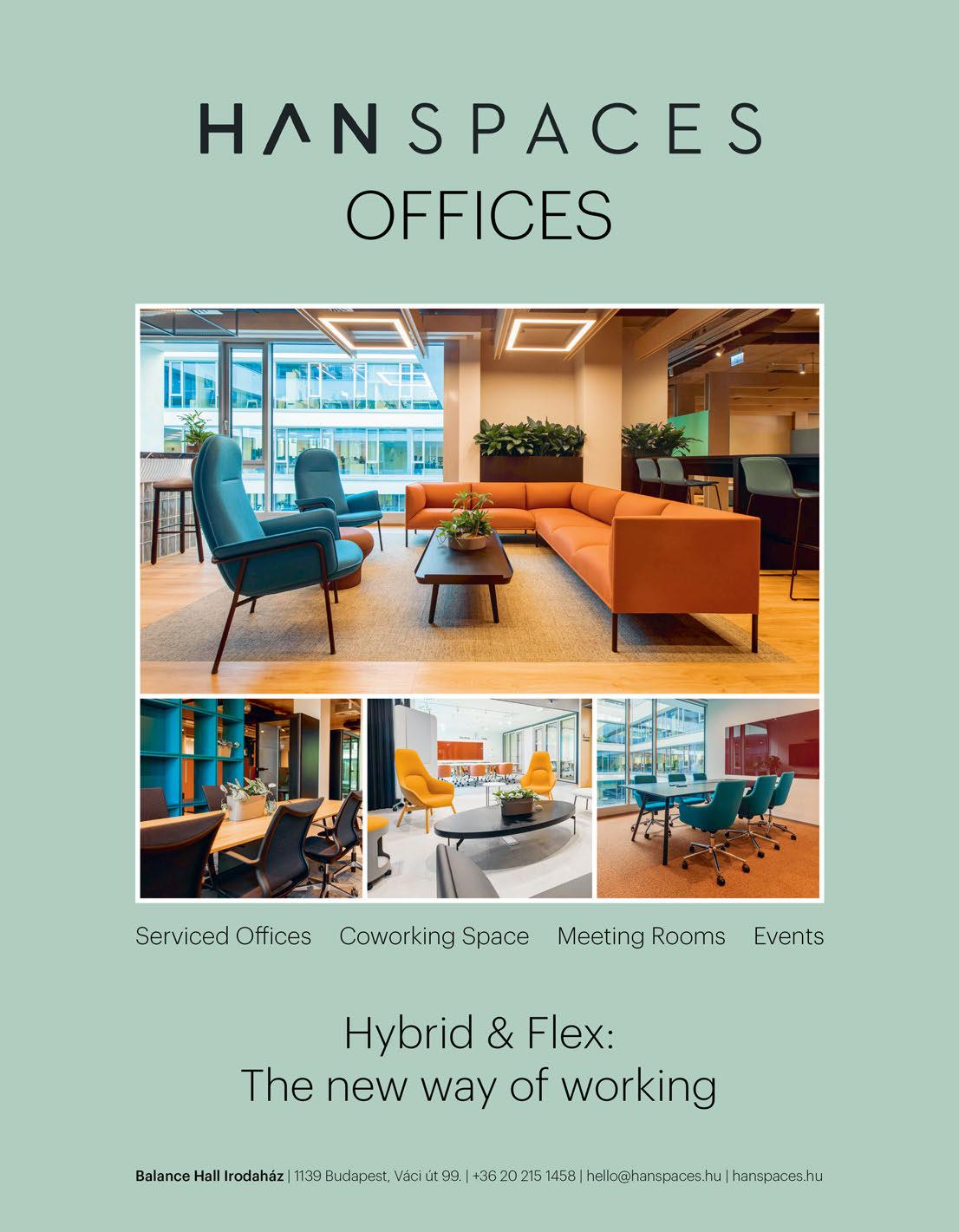
It is 15 years this month (on October 26, 2006) that Çelebi Ground Handling Hungary Ltd. was founded. Today, Çelebi is the market leader in the ground handling market at Budapest’s Ferenc Liszt International Airport. What is the scope of services you offer to airlines, passengers and others?
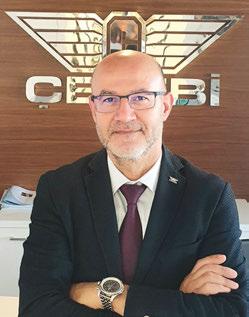

Çelebi took an important step within the framework of its strategy of pursuing international growth by taking over the ground handling services contract for Budapest’s Ferenc Liszt International Airport in 2006, thereby forming “Çelebi Ground Handling Hungary Ltd.” Çelebi Hungary has achieved a market leader position in both ground handling and cargo services, ensuring a diversified portfolio of more than 35 customers from various industrial segments such as scheduled, low cost, cargo driven and charter carriers.
In addition to providing full handling services, it has expanded its range of services to provide Ticketing, Lounge and Meet & Assist Service, branded as Çelebi Platinum Services. Furthermore, Çelebi is at the market leader position for General Aviation. The Terminal itself is operated by Çelebi and over 95% of the flights are handled by the Turkish company. With a capacity of 140,000 tons, Çelebi Ground Handling Hungary Ltd. ensures further synergies to its global customer base, with 13,000 m² of the warehouse space in BUD Cargo City.
The past 18 months have been a disaster for the airline industry. How much and in what way has your company been affected by the pandemic situation/restrictions?
As all other aviation players, we have also strongly been impacted by the COVID pandemic. By taking necessary actions and implementing them into our operations, we could slightly decrease its negative effects. We have directly prepared and implement our COVID-19 Standard Operating Procedures (SOP) in all our subsidiaries. All operational and managerial processes are reviewed and updated. New operational Key Performance Indicators (KPIs)/metrics are deployed with direct management involvement.
As a result of the COVID pandemic, some operational services are also included in our service portfolio such as COVID cleaning in aircrafts, COVID testing before flights, etc…
At the beginning of the pandemic, we introduced short working hours on each level starting from top management. Hybrid working model has been initiated in headquarters located in Turkey and also in Hungary. Also, some of our staff have been reallocated from passenger side to cargo.
From the beginning of this period, we have been transparent to both our external and internal customers. We have offered operational flexibility to our customers with their instantly updated plans. The continuation of operations, especially cargo and warehouse handling, is critical and by taking all necessary actions, we have continued to provide our services 7/24.



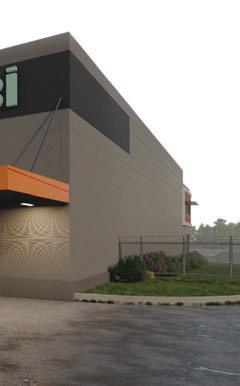
At the same time, the cargo arm of your business has been thriving. You have your own cargo facility in Vecsés. Please, tell us about that and also, how much it could make up for the losses in the ground handling services?

It is a fact that Cargo & Warehouse business has not been affected much as ground handling from the pandemic. We could have been affected much worse if we had not invested in cargo.

We managed to maintain our operations and our business has stayed stable during this period. Hopefully, with the developments in the industry and by taking related precautions, volumes would increase in 2022.
 Taner Sarı
Celebi Ground Handling - Hungary Managing Director
Taner Sarı
Celebi Ground Handling - Hungary Managing Director
According to our cargo business developments in Budapest, we are proud to be part of a great project; Alibaba designated Budapest Airport its East-Central European hub in response to growing e-commerce demand in eastern Europe. We are in close cooperation with the logistics arm of Alibaba Group, called Cainiao, and working closely to make this hub thriving.


Çelebi Ground Handling Hungary Ltd. ensures further synergies to its global customers, with – as I mentioned – 13,000 m² of warehouse space and 140,000 tons of cargo capacity in BUD Cargo City. The total amount of the investment is planned to be reach EUR 5 million until all implementations will be finalized.
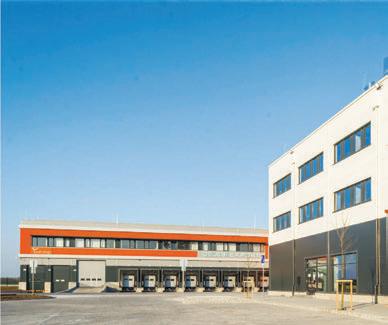

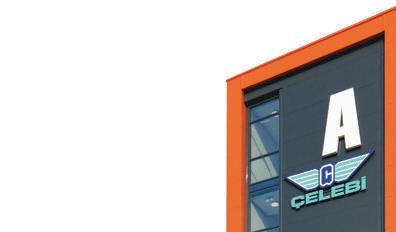
Early this year, Budapest Airport joined a quality assurance system encompassing all phases of pharmaceutical transportation in Hungary and Çelebi is one of the main partners in this. How do you contribute to the success of this initiative?
Budapest was the first station where Çelebi received IATA CEIV Pharma Certificate globally. It was really a tough period, we have successfully completed all the evaluations/audits and awarded with this certificate in March 2021.

Çelebi BUD was also the pioneer in this project, and obtained the certificate separately, before the other members of the community.

Çelebi has been very active in the Bud2020 developments. What has been your share?



At the beginning of last year, we have transferred our operations to BUD Cargo City the construction of which was undertaken by Budapest Airport. Moving to our new base led Çelebi Ground Handling to operate all cargo handling and warehouse services under the same roof. This integrated structure brings the convenience of Çelebi’s services to its customers from a single source and gives many advantages in terms of time, reporting, communication and cost.
We are pleased to offer the best quality services to our valuable partners in our new state-of-the-art warehouse.




Çelebi also serves one of the major carriers of the world, Turkish Airlines. What business opportunities do you see internationally in the coming years?
It is our pleasure to work with a major carrier as Turkish Airlines globally and supporting each other for our international operations/expansion actions.
With over 10,000 dedicated employees, Çelebi continues to operate on 3 continents, in 5 countries and at 40 stations. Our ambition is to expand our geographic coverage into more developing markets, while providing rewarding employment opportunities to a growing family of colleagues around the world and meeting the service needs of our partners.
turkish focus
tenants will be able to move in soon and we are really proud to have built it.” Since sustainability and environmental design are very important nowadays, referring to these aspects, Csaba Szilágyi says that energy efficiency, the built-in technology and systems are all up to 2022 standards. “Those who move in there will live in the future.”
Returning clients
“Besides Danubio, we are really proud of our other ongoing projects. We are building three major factory projects in Hungary for the largest Swiss food supplier as design & build contractor. We were awarded the first contract in 2020, and since then, two other large-scale contracts. Having this major client as repetitive customer with multiple projects – that is the real award for us as it shows Synergy’s trustworthiness and good cooperation with the clients,” he notes. Currently, Synergy is building the fourth factory for Procter & Gamble in Romania as well as being appointed for the civil works of a block of the first nuclear power plant project of Turkey, which was extended to the next block as well.
Your second home
WITH ONE FOOT IN THE FUTURE
SYNERGY REACHES DOWN TO ITS TURKISH ORIGINS TO LEAD THE INDUSTRY TO THE 21ST CENTURY

The Synergy Group, a leading general contracting company with a wide geographical presence, providing sustainable design and build services, celebrates its 20th anniversary this year. The company is constantly profiting from its Anatolian roots, reaching out to Turkey for human resources, materials or culture.
Synergy Construction Hungary Ltd. first made the headlines when it was selected by the Hungarian oil & gas and petrochemical trust MOL and the EPC (Engineering, Procurement and Construction) contractor Thyssenkrupp Industrial Solutions for site preparation and civil works for the new polyol factory in Tiszaújváros, NE Hungary. As for the relevance of that project in Synergy’s life, Deputy General Manager Csaba Szilágyi explains to Diplomacy&Trade that “after many years of established presence in the region, 2018 was our first year of activity in Hungary. The polyol plant is one of the biggest industrial developments under construction right now in Hungary and actually, we were the first contractor on site for that project. This is the biggest contract value in Synergy’s history so far. Our operation method, which we frequently use in other countries, was uncommon on the Hungarian construction scene at that time: we accommodate our foreign bluecollar workers mainly in the on-site camp facility. Although the local community was initially afraid of our presence, time justified this approach: our workforce was available continuously, without any conflict with the local community and without pandemic impact. Other developers, journalists also visited the site camp, and lately, other clients requested to install similar site camp facilities.”
Built for the future
In Hungary, another major project by Synergy as general contractor is the development of the Danubio residential complex in Budapest that has been recognized, among others, by the European Property Awards in the Multi-Residential Real Estate Architecture category. As the Deputy General Manager notes, “Danubio is a unique residence due to its prime location, elegant architecture, materials and construction details – all of these together make it a really state-of-the-art compound. The first phase is just about to be completed, the first

The latest venture by Synergy is Han Spaces that offers office space with special settings. As to how the idea came to start a business like this in Hungary, the Synergy Deputy General Manager explains that they were looking for an office for themselves because “we grew rapidly and we needed flexible expansion space. And then, we realized that in this COVID-19 situation, people are really looking for serviced offices and co-working areas instead of home office. We decided to make one, which secondarily can also act as a buffer space for ourselves.” He adds that people feel the difference from the usual office setting when they sit down. “It is just as good and comfy as your second home.” The office area in Balance Hall in Budapest became a co-working hub for startup and scaleup companies, who can instantly get in the bloodstream of construction industry players.
Constant Growth
Throughout the years, Synergy grew into a truly international company with large-scale projects in Hungary, Romania, Germany, Poland, Georgia, Ukraine and Turkey for high-profile clients. The driving force and fuel of internationalization is the heated construction market combined with Synergy’s established know-how, own workforce and cross-border access to resources such as manpower and building materials. “We obviously prefer local sourcing. But we must not allow shortages in manpower or building materials to have a negative impact on our performance and clients’ satisfaction. In these cases, we utilize our international sourcing network and reach out to reliable supplies across borders. This way, we can outrun our competitors by two laps.”
In conclusion, Csaba Szilágyi highlights that “we wish to maintain the growth rates of the recent years: with human resources, with turnover, with customer satisfaction and all other performance indicators, which prove our professional and financial health.”

turkish focus
HISTORIC EXCELLENCE AND COMFORT
OPENED THIS SUMMER, MATILD PALACE ALREADY RECOGNIZED AS ‘HUNGARY’S LEADING HOTEL’
Originally built 120 years ago as one of the two baroque palaces acting as a gateway towards Elizabeth Bridge, the Matild Palace went through several years of renovation by the Turkish Öyzer Group before it opened this summer as ‘Matild Palace, a Luxury Collection Hotel, Budapest’, part of Marriott International.
Excellent gastronomy
The Spago restaurant presents a new era of dining in the Hungarian capital by worldwide-renowned master chef Wolfgang Puck. The General Manager stresses that “Wolfgang Puck's Spago restaurant started very strong – we have a lot of returning local guests already and foreigners often travel to Budapest just because of Spago..., which amazes me. I think it happened last month that an Austrian couple visited us just because Wolfgang Puck was in Budapest. So, yes, gastronomy plays a really big role in the experiences offered by Matild Palace. Our rooftop bar, The Duchess is also operating along with the gastronomic concept of Wolfgang Puck... It provides an amazing 360-degree panorama of the city. And there is another really special venue in the building, the historic Matild Café & Cabaret, which is the reimagination of the famous Belvárosi Kávéház. It will open in 2022 and in the daytime, it will be an easy-going café house, while at night it will transform into a different face where Hungarian and international cabaret shows are performed on a hydraulic elevated stage. So, we have a very diverse, rich offer to our guests... I am sure everyone will find something exciting at Matild Palace.”
Hungary's Leading Hotel
As the hotel’s General Manager, Emre Pasli explains to Diplomacy&Trade, the building is owned by Melis Investment Ltd., which is a part of Turkish Özyer Group established in 1948. The founder the Group, Suleyman Özyer started the business in the jewelry sector and extended the investments into different markets, like tourism, real estate or the renewable energy sectors. The company has extensive experience in the tourism sector. Today, the Özyer Group is managing 11 hotels and resorts with different categories, with a total capacity of over 8,000 beds. “So, the company's investment in the hotel industry is not surprising… and we are very pleased to be able to bring the Luxury Collection brand to Budapest under an agreement with Marriott International, Inc.,” he says. The owners were looking for a place, a building that has a special history and represents authentic values in Europe.

“We searched for historical buildings in lots of European countries and eventually, chose this iconic building in Budapest because it has a rich cultural heritage and on the other hand, Hungary is very well located in Central Europe. Travelers can reach Budapest easily. Therefore, it was the owners’ decision to invest in this building, and they believed that this is the right time, the right place, and the right country,” he adds.
He believes that this investment is extremely important for Budapest and Hungary as an iconic building of the city was renovated and gained its full splendor back. "We have invested a lot so that this historic building is restored to its glory and that jobs are created. These days it is very important for all economies to try to recover as soon as possible after the pandemic times, especially for tourism that has been one of the most severely affected sectors."
A royal palace experience
It is the first Luxury Collection Hotel in Hungary located in a historical building. “Matild Palace is a celebrated debut and an important milestone moment in the growth of The Luxury Collection brand and my personal opinion is that we can offer very different experiences in different forms for the Marriott
clientele. Matild Palace allows our guests to realize the fantasy of living within a royal palace that was built in 1902, elevated with modern amenities and impeccable luxury services. I think that's unique experience in Budapest. I believe that The Luxury Collection brand of Marriott was the perfect match for this beautiful historical building, the Matild Palace, as it is the perfectly representation of the local culture, history and architecture, which is the main characteristic of the Luxury Collection brand; offering authentic experiences for today’s global travelers in the world’s most desirable destinations,” Emre Pasli highlights. Marriott – the largest hotel company in the world – had already a strong representation in Budapest in the 4- and 5-star segments, with hotels and long stay apartments but until now the luxury segment was only represented by the Ritz-Carlton. “We felt that it is a good opportunity for us to strengthen the luxury hotels portfolio with the debut of The Luxury Collection in the city,” he points out.
Perfect setting
The Matild Palace provides a perfect setting for international travelers seeking authentic experiences and exceptional service in an intimate setting. The General Manager is of the opinion that the first part of the ‘perfect setting’ is the iconic palace and its remarkable history. Matild Palace was built during the Belle Époque era to serve as the social hub of the city. The historic palace was planned to serve several social functions: it was a gastronomic and social center as well as a workplace and home for many. The basement hosted a café while the first floor provided space for civil unions and clubs. In 1901, the famous Belvárosi Kávéház (‘Downtown Café’) was also opened in the building. So, it was the perfect cultural and entertainment venue of Budapest. The second part of the ‘perfect setting’ are our services. Matild Palace is now featuring brand-new culinary concepts like Spago by Wolfgang Puck, The Duchess, a secret rooftop bar, and the soon-to-open Matild Café & Cabaret. Our gastronomic offer is very diverse, and with the opening of the café, we bring even more cultural experiences to the everyday life of the people of Budapest.”
The Matild Palace has been announced as ‘Hungary's Leading Hotel 2021’ by World Travel Awards. As Hotel Manager Selim Ölmez notes, “this recognition has been rewarding excellence in the travel industry since 1993, inspiring those working in the sector to continually improve the quality of their services and products. We are also working on this in Budapest, and the award shows that others also recognize our efforts. It is a great honor for us, for our whole team, to have earned this prestigious award and to be ranked among the world’s best hotels by more and more international media. We believe this is just the beginning and we can draw further attention to this fantastic city that deserves recognition very much from the international press.” Apart from this award, Matild Palace receives a lot of recognition from international media. “Great Britain's oldest and most prestigious conservative daily, The Times or The Robb Report (in the U.S.) have written about us in the past. The feedback from our guests is also very positive. There are a lot of returning guests at the Spago and the Duchess. Unfortunately, due to the COVID-19 pandemic, there are fewer international hotel guests at the moment, but we were prepared for that. We believe Hungary and Budapest are upcoming and truly desirable destinations attracting more and more travelers in the long run,” the Hotel Manager concludes.

turkish focus
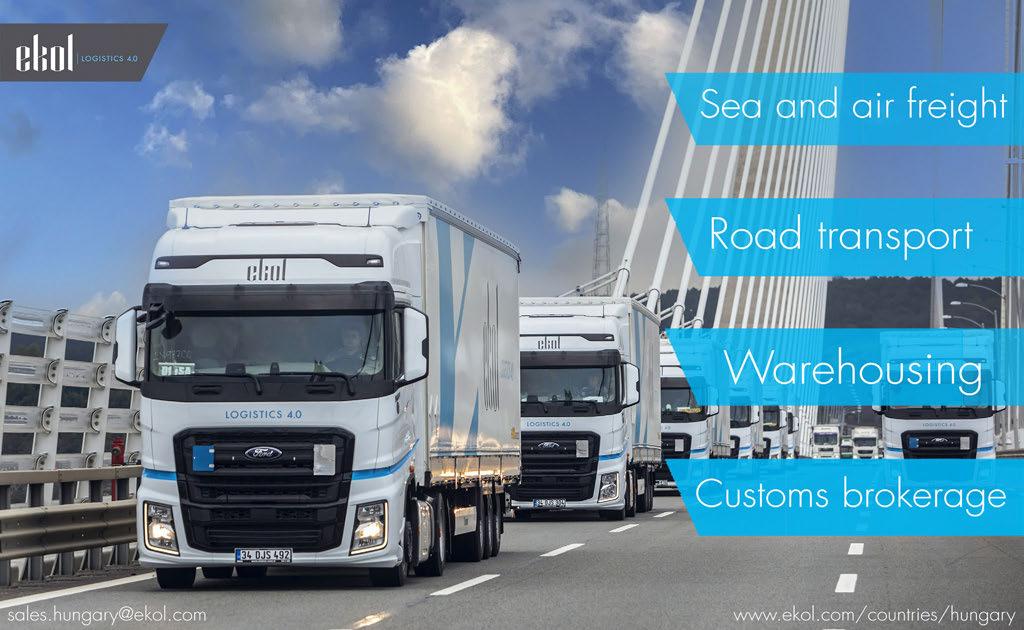
GÜL BABA TÜRBE: A HISTORIC BUILDING COMPLEX
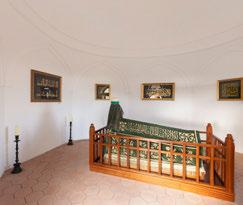
THE TURKISH SHRINE IS ONE OF THE OLDEST ARCHITECTURAL MONUMENTS IN BUDAPEST
Gül Baba Türbe, the tomb of an Ottoman-Turkish soldier-monk that now also serves as a Turkish shrine providing a magnificent view of the River Danube and Margaret Island, can again be visited in the Buda Hills for over two years now.
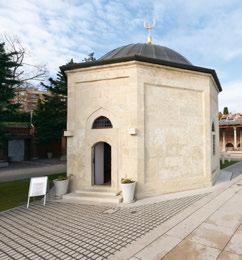
Gül Baba (‘Father of Roses’) was a dervish from Bektas who escorted the Ottoman army during the reign of Sultan Mohamed II when raiding Europe in the first half of the 16th century. The ‘Rose’ in his name is a sort of spiritual rank indicating that he was considered to know God deeply, in a transcendent way.
Gül Baba arrived to Buda in 1541 accompanying Suleiman the Great I and the Turkish army. According to legend, he died on September 2, 1541, on the day when commemorating the occupation of the town. Gül Baba, the dervish respected much among the ottomans, was buried
on the hill outside the city limits of that time where his honorary monument is also situated. Between 1543-1548 a closed tomb (mausoleum) was erected above his grave. During the Ottoman occupation it became customary for the Ottomans to use the area around the tomb as burial ground. In 1686, during the second siege of Buda, the Habsburg army did not disturb the tomb and later the Jesuit priests transformed it into a Catholic chapel, and throughout two centuries the tomb existed in this form.
In 1885, the Ottoman government assigned János Wágner Hungarian architect to restore the tomb and the surrounding monument. He
built a supporting wall around the buildings. After a restoration in 1914, the monument was declared Hungarian national monument. In the 20th century, the tomb and the surrounding building complex were renovated and reconstructed several times, but the significant renovation of its condition could not be achieved. By the beginning of the 21st century the building complex needed thorough restoration, thus the venue was closed for several years, no visit was permitted.
In 2015, a Hungarian-Turkish agreement was signed on carrying out the heritage tasks of the tomb and its surroundings as well as on the complex landscaping, and the works finished in 2018. The tomb was studied professionally, there were heritage works, and the direct and wider surroundings were organized from architectural and landscaping perspective at a higher level. As a result, not only the Ottoman historical building can be visited in the building complex, but there is a cultural center whose main important elements consists of the permanent exposition established in the basement of the former Wagner villa, the tea-house and café connected to that basement, there are premises to hold various performances and workshops. All this with the surrounding garden forms a historical building complex with sensitive landscaping solutions: a living cultural center.

carbon neutrality
HUNGARY – THE WAY TO CARBON NEUTRALITY
BY GÉZA LOSONCZY AND GERGŐ WIEDERIn terms of renewable energy development, Hungary's sole focus is on solar energy. According to the strategy, by 2030, solar's total installed capacity should reach 6.5 GW, which is around 40-50% of total installed capacity in Hungary, and almost equal to peak demand (around 7 GW). Despite the aggressive ‘solar only’ concept, this plan is in line with European trends. Compared to classic capacity portfolios, solar-based portfolios are decentralized and solar-based generation is highly intermittent, therefore – besides capacity development –, a significant strengthening of the low-, medium- and high voltage networks is required. An additional issue is the increase of balancing power and ancillary service demand. Currently, the maximum automatic frequency restoration reserve demand is around 500 MW. Assuming the targeted 6.5 GW solar capacity is achieved, demand will double (to around 1 GW). The exceeded balancing and ancillary service demand create the need for additional gas-fired capacity development.
Solar backed up by nuclear
As solar plants create carbon neutral energy only when the weather conditions are appropriate (which is only around 25% of the year), further supply will be needed. Due to its geographical conditions, the most realistic answer for Hungary is nuclear capacity construction. Towards that end, there are two projects which are ongoing. One is the lifetime extension of the Paks 1
nuclear power plant, while the second is the construction of the Paks 2 nuclear power plant. The lifetime extension plan, which will elongate the existing Paks 1 nuclear power plant's life by ten more years, is under technical, legal and commercial review. Construction of the Paks 2 nuclear power plant is to provide carbon neutral power for Hungary and the broader CEE region for the next 60 years. The development will have material impact on the power supply of the region. Without nuclear energy, it would be very difficult for Hungary to attain its carbon neutral power supply security objective.
Energy efficiency
The third way to reach carbon neutrality for Hungary is an intensive improvement of buildings' energy efficiency. According to the Energy Efficiency Directive of the European Union, Hungary should improve energy efficiency by 32.5% by 2030, which means an approximate increase of 7 PJ/year to meet the energy efficiency target. To facilitate the process, the Hungarian government has introduced a new energy efficiency obligation system. The energy regulator has introduced penalties for electricity, gas and fuel providers as well those who are
not able to generate sufficient energy efficiency investments. The regulator and industry expect an additional EUR 3 billion in energy efficiency investments in the next ten years. The primary investment targets are residential and nonresidential buildings, and the improvement of energy efficiency for industry and for services. The energy efficiency obligation system does not support power generation investments.

Financing green investments
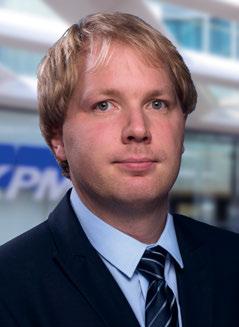
According to estimates from the Ministry for Innovation and Technology, the financing needs of the carbon-neutral transition could reach HUF 50 trillion by 2050. Given the huge sums involved, the role of the financial sector will be very important in providing financing sources for these investments and developments. Several measures have been taken at both the European and national levels to encourage this evolution. In Hungary, the National Bank of Hungary (MNB) has established incentives for banks to support green financial products, and for setting up new schemes for facilitating investments towards carbon neutrality:
1. Housing loans: In respect of property sale and construction, real estate should have an energy rating of ‘BB’ or better. In the course of refurbishment the project should include at least one modernization measure specified by MNB (e.g. installation of solar panels, or thermal insulation). MNB imposes lower capital requirements on disbursing institutions, if the APR on the ‘green’ loan is at least 0.3 percentage points more favourable (compared to other similar products).
2. Corporate and municipal loans: A significant capital requirement discount can be applied in cases of investment or project loans financing renewable energy production.
3. Green bond exposures: MNB has introduced a capital requirement discount for banks investing in such green bonds. Furthermore, the MNB itself is active as an investor in the green bond market in Hungary.
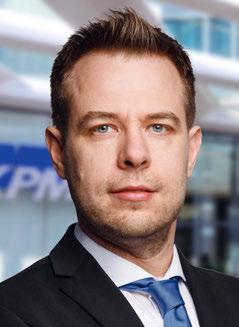
4. New funding program for individuals: As part of the Funding for Growth Program, MNB will launch a new preferential loan program with a budget of HUF 200 billion. MNB provides refinancing to credit institutions at a 0% interest rate, which they can use to lend to the retail market at a fixed interest rate of 2.5% with a maximum maturity of 25 years if such loans are used for new, highly energy efficient (at least BB-rated) residential properties. The program provides a significantly higher credit line compared to other state-subsidized loans available, up to HUF 70 million.
Involvement in green lending has already been widely featured on the agenda of domestic credit institutions' product development plans, and such products are increasingly available at more and more financial institutions, but overall, they are not ubiquitous on the domestic market. This could change through MNB's new programs, which might also give a boost to the supply of specifically green credit products by providing favourable financing. This is important for financing renewable energy production and, more importantly, improving energy efficiency, thus setting a course towards net zero targets.
INCREASING SOLAR CAPACITY IS NOT ENOUGH, ENERGY EFFICIENCY MUST ALSO BE IMPROVEDGÉZA LOSONCZY GERGŐ WIEDER
carbon neutrality
ACTING IN A SUSTAINABLE AND RESPONSIBLE WAY
SHELL TAKES ITS MISSION TOWARDS SUSTAINABLE BUSINESS IN HUNGARY IN STEP WITH SOCIETY
“Sustainability is a legitimate expectation of our customers, so it is our ambition to become a net zero emission energy business by 2050 or earlier in step with society.” That is how the Country Chair of Shell Hungary, Andrea Istenes Solti explains her company’s commitment to a more sustainable future.
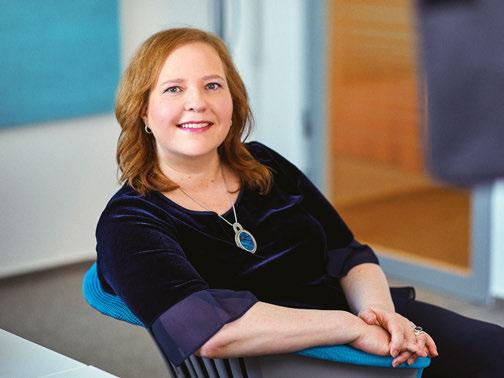
“Shell is one of the largest energy companies in the world and we are well aware of our responsibility towards the planet. We aim to provide more and cleaner energy solutions in a responsible manner, balancing short- and long-term interests and taking into account the economic, environmental and social considerations” the Country Chair points out. She believes there is no other way but to proactively shape our future, not just adapting to the circumstances. “The world is changing, and the future belongs to those who can drive sustainable business solutions.”
Accelerating towards net-zero emission
Shell’s main initiatives and actions in Hungary are focused on running its retail business in a sustainable and responsible way, looking to reduce carbon footprints of its sites, and helping its customers to decarbonize their journey.
“Shell’s target is to become a net-zero emissions energy business by 2050 or sooner, in step with society’s progress in achieving the more ambitious goal of the UN Paris Agreement: to limit the rise in average global temperature to 1.5° Celsius above preindustrial levels. This could only be achieved by joint efforts. So we must work closely with our customers” points out the Country Chair. For Shell becoming a net-zero emissions energy business means an absolute emissions reduction target of 50% by 2030, compared to 2016 levels on a net basis, which covers all emissions under Shell’s operational control. Actions underway as part of our Powering Progress strategy offer customers lowand zero-carbon products and solutions to avoid, reduce and compensate for emissions from energy use.
“We are transforming our business and finding new opportunities and I am pleased, that some of our key decarbonization initiatives is now also available in Hungary, such as the Nature-Based Solutions which includes reforestation partnerships, carbon credits and carbon neutral products,” she adds.

Carbon Compensation Program
One of the ways to achieve the net-zero emission sustainability target is our new initiative, the Carbon Compensation Program.
Shell offers the option to its customers at all service stations to offset carbon dioxide emissions from their fuel purchases. Business customers can decide to compensate their carbon footprints for an additional fee when refuelling at any of Shell’s 190 service stations in Hungary. “Businesses like transport
and logistic companies are using lots of fuel and have large vehicle fleets and therefore they can make a big step forward in supporting our common goal of CO2 emission compensation. We are partnering with all our customers as they make changes in sectors that are difficult to decarbonize like road freight,” she says.
Retail customers can also participate in the program. The Country Chair emphasizes that “this is up to the customers; they are the ones who can decide to participate and pay a fee to compensate their carbon dioxide emission footprints.” Using this money, Shell offsets CO2 emissions by purchasing carbon credits from nature-based projects, such as the Cordillera Azul National Park Project in Peru and Katingan Peatland Restoration and Conservation Project in Indonesia. The company sources carbon credits from projects that are certified under credible, high-quality and independent standards. Every carbon credit represents the avoidance or removal of 1 ton of CO2
Hungary takes its share
Last year, Hungary became a pilot market in Central and Eastern Europe for the launch of e-mobility solutions at Shell service stations. The company opened its first high-powered charging stations in the region in partnership with IONITY to make long-distance journeys by electric vehicles easier. Furthermore, last year, Hungary became the fifth market in Europe where Shell Recharge, the company’s own electric vehicle charging brand was introduced. Shell Hungary has also made steps to reduce the emissions from own operations. Most Retail stations are powered by electricity coming from renewable sources. Other energy efficient operations at the service stations include LED lighting and appliances consuming less energy. “We work on more sustainable packaging including reducing plastics at the forecourt and in the shop. Besides the Carbon Compensation Program, we also introduced carbon neutral lubricants across a range of products for passenger cars, heavy duty diesel engines and industrial applications. We take our mission towards sustainable business seriously,” Andrea Istenes Solti concludes.
carbon neutrality
IT IS TIME TO TRANSFORM!
HOW BUSINESS CAN LEAD THE TRANSFORMATIONS THE WORLD NEEDS

In 2010, the World Business Council for Sustainable Development (WBCSD) published its original Vision 2050, calling for a world in which more than 9 billion people can live well, within planetary boundaries by mid-century. Now, the organization says "this vision is still within reach – but we have to act faster. We have updated Vision 2050 to provide the business community with comprehensive, reliable and ambitious guidance on how it can lead the transformations the world urgently needs." Julian Hill-Landolt, Director of Vision 2050 at WBCSD titled his lecture at the annual Business Lunch of the Business Council for Sustainable Development in Hungary (BCSDH) as “It is time
Why this title? The Director gave a simple explanation to Diplomacy&Trade: “Well, we didn’t transform! Politically, intellectually and culturally, we have failed to act on the information that we have had available and now there is even less time left for us to act and avoid breaching the safe operating space for humanity.” He adds, however, that it is also true that for some time, momentum has been building to a point where the right level of action can finally be taken. “From the beginnings of the environmental movement in the 1970s to the coalition-building efforts of the last decade, we are now at a point where more and more governments, companies, investors – and more broadly the general public – are truly beginning to rally behind the need for transformational change. I think that the zeitgeist has finally caught up with the urgency of the challenges that we face. We have to bring the transformations about, and doing so will require systemic solutions and collaboration on a massive and global scale, unique so far in history. Such collaboration demands a shared view of the world that we need and want, of the challenges that we must address and the things that will have to be made possible. So Vision 2050 is called ‘Time to Transform’ because a shared, realistic and yet ambitious vision will be essential to delivering transformative innovation and global progress at the necessary rate and scale.”
Vision 2050
The Director is of the view that to bring about a world in which 9+ billion people can live well, within planetary boundaries, will require that “we, as Bill Gates has said, ‘transform everything’. Energy, mobility, housing, food, products – all will have to be transformed so that they can be enjoyed sustainably by people all around the world. These transformations are required because we are facing multiple layers of risk and even potential collapse. Every day, pressures mount on the climate, on the biodiversity that all life on earth depends on, and on society through growing inequality and polarization.” He stresses that these challenges are existential –for individuals, for societies, for businesses. “A 3 ºC world is unrecognizable from the world we live in today. There is no safe operating space for humanity absent a rich and thriving natural world. We cannot allow societies to get more and more unequal – all historical evidence points to that leading to civilizational collapse. Ultimately, future business success relies on thriving communities to trade with, and a healthy planet for us to exist on. Vision 2050 lays out the actions and adjustments that are needed across nine areas where business provides
essential products and services into society, and it backs these actions up with guidance on the mindset shifts and enablers of transformation that are critical to successfully driving real transformation at the rate required. It is important to remember that businesses have to help drive that transformation while remaining profitable today, so there’s a really important balancing act that has to take place between innovation and investment in the future, and managing today’s revenues, which are the lifeblood of future change. Vision 2050 helps companies navigate this tightrope of transitions towards our Vision.”
Helping the message go through
These are important and justified goals but the question arises: is the business community listening to this call? And if so, to what extent?
Julian Hill-Landolt highlights that ‘Vision 2050: Time to Transform’ was developed over a period of nearly two years by WBCSD member companies in close collaboration with an external review committee of leading global experts. It incorporates the perspectives of leading planetary and social scientists who supported the work with inputs and interviews. It is the result of a global consultation process that leveraged WBCSD’s Global Network, an alliance of more than 60 CEO-led business organizations worldwide, encompassing some 5,000 companies. The final report has been endorsed by 42 senior executives from WBCSD’s
member companies, who signed its foreword and leadership statement and participated in a CEO launch video. In this sense, key stakeholders were already listening before it was launched, as they were closely involved in its creation.

“We also get our message to the global business community through our Global Network partners,
such as BCSD Hungary. For instance, we’ve completed translations into Chinese, Spanish and Hungarian and translations are underway in other languages (Japanese, Finnish, Turkish, Italian, Portuguese). In addition to these translations, we have collaborated with our partners to introduce Vision 2050 in over a dozen countries. Furthermore, our President and CEO, Peter Bakker (former CEO of TNT) has made over 50 Vision 2050 presentations since launch to company supervisory and executive boards, and at C-level roundtables. The feedback we have had has been very positive with boards appreciating Peter’s frank assessment of the current situation for business, the introduction to Vision 2050’s framework, and the ability to answer questions on a range of different business challenges and the linked areas of guidance that Vision 2050 offers.”
It is about survival
There is a price to be paid in the present for future sustainability. Many believe that current hikes in energy prices can partly be tied to purchasing carbon zero quotas. However, Julian Hill-Landolt is of the view that current energy price hikes are being driven by far more complicated geo-political factors than carbon zero quotas and the question about sacrifice is a short-term question. “This isn’t about sacrifice – it is about survival. Transformation is essential for the survival of civilizations. It’s that simple. We need to start painting a picture of the future that we need to move towards – one that is more resilient, that has a lighter footprint, that is fairer. We are not asking for sacrifice, we are asking for determination, ingenuity, cooperation, hope, optimism. And this shouldn’t just be expected from individuals. It is vital that companies and their owners all understand that we aren’t talking about sacrificing profits in the short-term – we are talking about investing in medium-term corporate survival. We have to factor in transition risks, correctly allocate investment to transition costs, and work towards the transitions and transformations that will mitigate these risks. This is the only way that companies can safeguard their ability to generate long-term value, and therefore their future success,” the Director concludes.
to transform.”
CARBON COMPENSATION
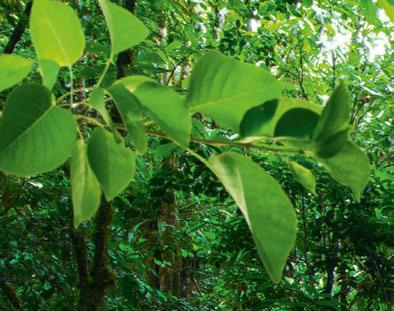

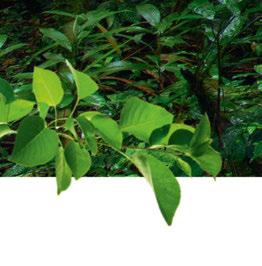
CO2 compensation for Shell fuel cardholders




Further details: shell.hu/karbonsemlegesites_flotta GO WELL


Information not complete.

One of the international exhibitors at the World of Hunting and Nature Exhibition held in Budapest recently was the Saudi Falcons Club. Its CEO, Hussam Bin Abdulmohsen Al-Huzaimi talked to Diplomacy&Trade about the strong historical bond between humans and falcons, how falconry can be used as a tool of biodiversity, among other issues.
GUINNESS CERTIFICATE AND REHABILITATION
For the promotion of this sport, the Saudi Falcons Club received a Guinness World Record Certificate of the largest falcon festival race tournament in the world, that is the King Abdulaziz Falconry Festival. We hold this every year. “That is the promotion part. The other aspect of the work we do and aim at is to preserve a falcon in nature. Every year, the Falcons Club has an environmental program that aims to release falcons to the wild. Basically, when falcons reach a certain age and become old, we ask the owners through our campaigns to give these falcons to us. Then, we take this old falcon and we provide take eight or nine months of full rehabilitation after which we will be able to release the donated falcons to the wild in order to increase the population of the species. This effort of ours has recently been recognized by the IUCN World Conservation Congress in Marseille, France. We presented our program at the IUCN, and we set up a huge workshop there showcasing how that program has contributed to wildlife conservation,” the Saudi Falcons Club CEO explained.
FALCONRY: CHERISHING AN ANCIENT SPORT
SAUDI FALCONS CLUB RECEIVES INTERNATIONAL RECOGNITION FOR THEIR WILDLIFE CONSERVATION PROGRAM
The Saudi Falcons Club was established by a royal degree in 2017 in order to preserve falconry as heritage and legacy.
Saudi Arabia – along with Hungary and many others –is also one of the countries where falconry is inscribed on the UNESCO Representative List of Intangible Cultural Heritage of Humanity. This ancient tradition in hunting with birds of prey also has a history in Hungary, specifically with the Saker Falcon, which is and endangered species at the moment. In general, falconry in Europe has been the sport of royals and noblemen since medieval times, the CEO explained.
A strong bond
Saudi Arabia has also a very long history of animal sports, not just falconry but also involving horses and camels – these go back thousands of years. Archaeologists discovered, in an area in southern Saudi Arabia, inscriptions from more than 6,000 years ago about taming horses and falconry as well. In those times, the bond between humans and falcons for finding food was very strong: falcons needed human and humans needed the falcons, he added.
“In Saudi Arabia, we have more than 25,000 active falconers at the moment. These falconers have learned this hobby and experienced this sport from their grandgrand grandfathers. They have learned taming and protecting falcons and the need to enliven in this heritage. As it is part of our heritage running in the family from our ancestors, we have a clear objective to protect it,” Hussam Bin Abdulmohsen Al-Huzaimi pointed out.
A tool of biodiversity
He believes that falconry is a biodiversity tool. “It's not just your regular hunting with using weapons and using advantages. When you hunt with falcons, there is no advantage – it is mother nature at its best. Falconry is a great example of this. For me, and for sure many others, falconry is sustainable hunting at its best. It is just pure hunt and I believe that this is something that we need to further develop and pass the experience on to others rather than using weapons for hunting.”
Being at the exhibition, the CEO said feedback is exciting. “People are amazed when they see the falcons, you can see how they want to get near the birds and they want to
experience something unique. For them, it's very attractive even for the younger ones: when they see the falcons, they cannot keep that eye off the birds. Then, the question arises: ‘can I own one?’ ‘Can I train it?’ Trust me, you can. It is easier to do than with any other pet. However, you need to have that bond and you need to have the right knowledge of training falcons and taking good care of them.”
Leagues of their own
For those deciding to take on falconry, the Saudi Falcons Club CEO suggested they
buy captive-bred falcons and not wild ones. He mentioned breeding centers in Europe, including Hungary. The top clients of these centers are from the Middle East, especially the GCC countries like Saudi Arabia. He believes it is a business the potential of which is not yet fully discovered. As regards international cooperation in the field of falconry, Hussam Bin Abdulmohsen Al-Huzaimi highlighted that “falconry has its own, let's say, league around the world. In every country, there is an association for falconry. When they see
other falconers from other country those use the same language, they have the same hobby and they have also an experience that they would love to share. This exhibition is a great opportunity for promoting breeding falcon centers in Hungary, businesses to sell falcons to their clients in foreign countries.”
The future of falconry
The CEO stressed that the Saudi Falcons Club has a clear strategy path. “The first one is promoting falconry as a human heritage – and we do this through our events.

We have three mega events. The King Abdulaziz Falconry Festival is the biggest falcons race in the world, attracting 2,500 falconers attending this race every year. Another event is the International Falcon Breeders Auction, attracting most of the breeding centers from Europe that showcase their breeds of falcons. The third event is the International Saudi Falcons & Hunting Exhibition, which is held currently in Saudi Arabia. It is an event where we promote the gears and tools that falconers need in order to train the falcons.”
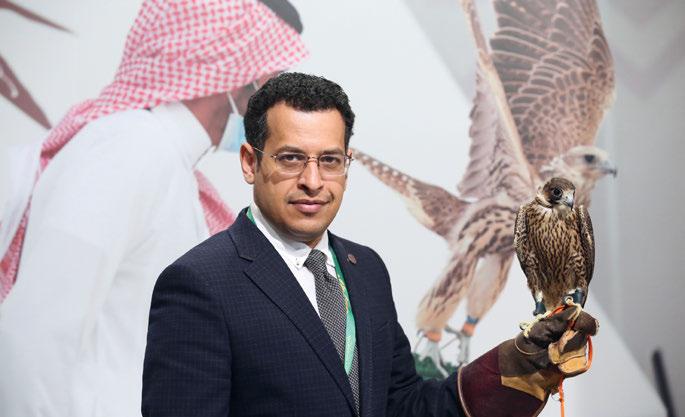
UNIQUE ELEGANCE AT THE LIENZ DOLOMITES
LUXURY WELLNESS HOTEL OFFERS A WIDE VARIETY OF SERVICES AND ACTIVITIES IN AND AROUND THE FACILITY
Lienz, a small town of 12,000 inhabitants, is the capital of East Tyrol – a 750-year-old, yet modern place, bustling with life, with a Mediterranean atmosphere and famous for its historic center. The town gives home to the first and only 5-star luxury wellness hotel in East Tyrol, the Grandhotel Lienz.
Situated at an altitude of 678 meters, the town lies at the confluence of the rivers Isel and Drava, surrounded by the Hohe Tauern National Park (Austria's largest national park) to the north and the stunning Lienz Dolomites, which are said to be among the most beautiful mountains in the world, at around 3,000 meters, to the south. Lienz is also known as the city of sunshine, as it boasts more than 2,000 hours of sunshine a year, 300 of the 365 days of the year are sunny. The vibrant town is enlivened by cozy cafés, restaurants and chic shops, and the proximity of Italy is a clear feature of the Lienz lifestyle: people live life here in the spirit of ‘La Dolce Vita’.
a host of pleasures in this magical atmosphere: elegant hotel furnishings, spacious rooms and suites to meet the highest standards, exquisite culinary delights and the GrandSpa spa & wellness area are all part of the pampering luxury.
The 72 luxurious guest rooms (some with a separate children's room) and the four exclusive Royal Suites are decorated in a predominant combination of burgundy, blue and green, combined with gold and dark woods, on each floor, overlooking the beautiful Dolomites and the Schober mountain range. The atmosphere of exclusivity and special details is preserved in the five restaurants spread over a total of 640 m². In addition, a bar, an impressive lounge with a fireplace and a multi-level hotel terrace with a magnificent view directly overlooking the banks of the river Isel, serve to ensure a pleasant stay for guests. The hotel is also an exclusive base for lovers of golf, skiing, nature and culture.
Culinary delights
catering – includes a buffet breakfast in the morning and a four-course menu in the evening. The hotel's wine cellar is available for small to large events for a fee. There is a wine to suit every culinary taste, with 170 different types of wine to choose from. 70% of the wines come from the wine-growing regions of Austria and 30% from all over the world. The wine selection is never brief, as the owners ensure the purchase of 6,000 bottles of wine every year.
Grandspa: spa & wellness
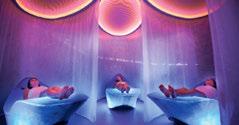
LEISURE ACTIVITIES IN AND AROUND LIENZ
Lienz and its surroundings, a winter and summer holiday paradise, offer a wealth of activities for young and old alike.


Schloss Bruck
The town of Lienz has a rich historical and cultural heritage. Attractions include Schloss Bruck, Lienz's ancient castle and symbol of the town. The huge castle complex was built in 1252. It became the property of the town in 1943 and has since been home to the town museum. The old tower of the castle offers a magnificent view of the town.
Aguntum
The Romans were the first to settle in the Lienz valley and founded Aguntum, the only Roman city in Tyrol, which flourished during the reign of Emperor Claudius. Today, the ruins of Aguntum and the museum exhibition bear witness to these times, offering a fascinating insight into Roman culture.
OLALA International Street Theater Festival
Extraordinary light shows, breathtaking acrobats and performers, humorous mini-performances and clowns entertain the audience. 90% of the performances are usually free! The Olala Festival has grown to become one of the most important, innovative and exciting festivals of its kind in Europe, and Lienz's summer cultural calendar would be unthinkable without it. Last held before the pandemic, the festival hopes to be back as soon as possible.
Kletterpark Lienz
For endless opportunities to spend active leisure time and a special challenge, every member of the family is welcome to visit the exciting adventure park on the Schlossberg Mountain in Lienz, created in 2010, where young and old can test their skills on sliding rope courses of varying difficulty and at different heights.
Pampering luxury
The first and only 5-star luxury wellness hotel in East Tyrol, the Grandhotel Lienz, opened its doors in April 2009. Situated directly on the banks of the river Isel, Austria's only glacier river, and only a few minutes from the historic center of Lienz, the hotel offers a rich variety of services. The owners of the Grandhotel Lienz, the Simonitsch and Westreicher families, are true to their philosophy of pampering their guests not only with luxurious surroundings, but also with a personalized service. Guests can enjoy
Mr. Flaschberger, the hotel's chef, conjures up new and light dishes from old, traditional recipes. His culinary concept is a traditional cuisine of seasonal and regional products, complemented by knowledge of modern nutrition. The 'dolomitic' cuisine aims to give full expression to the region's products.
The "5 Sterne Gourmetpension" – 5-star gourmet

The Grandhotel Lienz has a spa & wellness area of over 1,400 square meters, with indoor and outdoor pools, seven treatment rooms and a ‘private spa’ for couples. In addition, guests can enjoy a bio sauna, Finnish sauna, several steam baths, a serai bath, relaxation areas and a romantic garden on the banks of the river Isel. The rich offer of treatments ranges from serai and wrap baths, ayurvedic treatments, relaxing treatments with aromatic oil, hot lava stone and East Tyrolean Mountain honey massage to medical massages (e.g. lymphatic drainage, sports massage).
Medical care
The spa and wellness area includes a so-called "SymbioMed Medical Care" section (245 m²), where Dr. Peter Lechleitner, a university professor, offers his patients valuable treatments in his private practice. The tests offered range from basic and intensive health assessments, fitness and vascular assessments, slowing down the ageing process, traditional Chinese medicine, homeopathy and weight reduction.
Activities in winter and summer
Lienz is the starting point for a wealth of sports. The Lienzer Bergbahnen – Lienz Mountain Railways – take visitors up to 2,278 meters. In the summer, you can go hiking or mountain biking in the mountains, or rafting on the Isel glacier river. In winter, Lienz is a skiers' paradise, with two excellent ski areas nearby. The Hochstein and Zettersfeld ski slopes are about a five-minute drive from the hotel. A visit to the cozy mountain huts is, of course, an unmissable program at the stations of the mountain ski routes.
The 27-hole golf course ‘Dolomitengolf Osttirol’, which is co-operated by the Grandhotel Lienz, is only a 10-minute drive from the hotel.
All year round Osttirodler
At the start of the 2010 winter season, the first all-season, all-year-round toboggan run in East Tyrol, the "Osttirodler", was opened. The 2.3 km long section offers a fabulous mountain scenery and a fantastic view of the town of Lienz.
witty leaks
WITTY LEAKS
IN THIS
PERSONAL
ARGENTINA:RESOURCES, ROOTSANDIDENTITY
A LOT OF IMMIGRANTS WERE WELCOMED IN THE 20TH CENTURY, INCLUDING THOUSANDS OF HUNGARIANS
BY
This September, the municipality of the southern Hungarian city of Pécs lifted the ban on tango dancing introduced in 1922. On this occasion, a ‘Tango Feast’ was held and I had the pleasure to visit the city. Among other activities, I had the opportunity to talk about my country and my people at the University of Pécs.

Welcoming immigrants
I began with a physical description of Argentina, including some sociological and cultural characteristics to help the audience to get to know my country a little better. Argentina, in the extreme south of the American Continent, has an area of almost 2,800,000 square kilometers to which one million more of continental shelf and 200 miles of exclusive economic zone is added. Between the most extreme points to the North and South of the country, there is a distance of 3,700 kilometers. Our maritime coastline has an extension of 5000 kilometers. In this immense and rich territory live 45 million inhabitants. An important part of them are descendants of foreigners or foreigners who fled from wars, misery or political, religious or racial persecution. These immigrants were received according to our Constitution when it states that it seeks to "ensure the benefits of freedom, for us... and for all men of the world who wish to inhabit Argentine soil."
Economic capacity
Argentina is known for its immense food production. The total production of my country would feed 400 million people. Almost ten times the total population of Argentina. However, an unjust distribution of wealth means that there are sectors of our population that do not receive adequate food to meet their needs. In order to demonstrate the importance of the agricultural industry and meat production in Argentina, I presented the audience with some figures for the year 2021: 20.5 million tons of wheat; 51 million tons of corn; 45 million tons of soybean; 3 million tons of beef and veal... Both in the north and in the south of our country there are important oil and gas reserves. Investments are being attracted in order to resort to new technologies... and to recover self-supply and exports. Argentina is a nuclear country. Since 1950, it
has been researching, producing and exporting nuclear technology for peaceful purposes. There are three nuclear power plants operating in Argentina with a total energy production capacity of 1,755 Megawatts. The National Atomic Energy Commission and the Province of Río Negro founded INVAP, a state-owned company devoted to research and production of high technology in nuclear, space, industrial, medical and scientific equipment. Our country is also committed to the production of renewable energies compatible with the environmental protection policies.
Roots and identity
In the lecture, I also made a brief historical reference in order to understand the reality of my people, which recognizes its roots and identity in the original peoples that inhabited our soil.
Today's Argentina has its origin in the mestizaje (the process of interracial and/or intercultural mixing) produced by the arrival of the Spanish conqueror and the successive migratory waves of the most diverse origins that continue to enrich our identity. We gratefully acknowledge this multicultural reality which, far from weakening our identity, strengthens it and projects it towards a destiny of universal fraternity in diversity, to which we intend to contribute. It is impossible to ignore the influence that Catholicism had in the formation of our society. It is undoubtedly the majority religion, but
at the same time it is especially convenient to distinguish the popular religiosity that nourishes the faith of our people with the institutional conducts of the Church, many times closer to the interests of the earthly power than to the message of the Gospel. In Argentina there is full religious freedom and the coexistence of all religions is exemplary. At the same time and as a consequence of the crimes committed by the genocidal dictatorship (1976-1983), the protection, promotion and defense of Human Rights have become a state policy. Likewise, since the return to democracy in 1983, there have been significant advances in matters of non-discrimination, promotion of gender equality and new rights.
‘Moral pandemic’
Also, I decided to explain briefly how a country so rich in human and natural resources cannot provide its population with the welfare it deserves. Argentina is the victim of a phenomenon that affects humanity as a whole. It is not about the pandemic that also affects us, but which we hope to overcome soon.
I am referring to something much deeper and structural that Pope Francis has denounced in all his encyclicals and statements on social issues. I believe that the causes that make the world a place where injustice, hunger, diseases, wars and forced migrations among other collective misfortunes reign, are not in the lack of resources, but in the unfair distribution of them. They lie in the selfishness and lack of solidarity of a system that pushes us towards individualism, uncontrolled consumption, exclusion and discarding, both of things and of human beings. Let us never lose sight of this context. If we do, we will be feeding new tragedies. This "moral pandemic" has proven its danger during the health crisis we are still suffering. This spiritual pathology has names. Uncontrolled consumerism that anesthetizes our consciences and stifles the fraternity of human beings and an economic-social system sustained exclusively on profit and governed by a market incapable of distinguishing differences, nor balancing inequalities.
Villa Ángela
Returning to my homeland, in the first 30 years of the 20th century, Argentine meat and grains allowed statistics to place us among
the first countries in the world. At that time the statistics had not shown the distribution of wealth. Migration figures from Europe show that Argentina was seen as a land of peace and hope. Between 1880 and 1915, three years before the end of the First World War, 7 million Europeans arrived in Argentina from Spain, Italy, Germany, Poland, Russia and Hungary. As far as Hungarian emigration is concerned, at present there is in Argentina a community of 40,000 Hungarian immigrants or descendants of them. During my visit to Pécs, we signed with the mayor of the city, Attila Péterffy the document that leaves without effect the prohibition of tango decreed almost a century ago and agreed to initiate the process of twinning between the city of Pécs and the city of Villa Ángela located in the Province of Chaco in Argentina. In Villa Ángela, there lives an outstanding Hungarian community that respects and cultivates the traditions of this millenary nation.
The current mayor of that city of almost 90,000 inhabitants, Adalberto Papp, is the son of a Hungarian who emigrated to Argentina. We hope that once approved by the authorities of the two cities, we can next year, sign the twinning agreement in the presence of the Mayor of Villa Ángela.
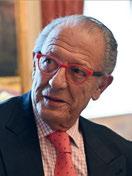
SERIES, DIPLOMATS SHARE
ACCOUNTS OF THEIR EXPERIENCES ON “EXCURSIONS” into Hungarian culture, art, gastronomy & scenery.THE AMBASSADOR OF THE ARGENTINE REPUBLIC, PATIÑO MAYER
ON THE TABLE - HUNTING AND REPRESENTATION ON THE AGENDA
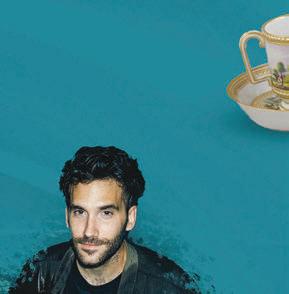
OCTOBER 08 – DECEMBER 31, THE MUSEUM AND LIBRARY OF HUNGARIAN AGRICULTURE


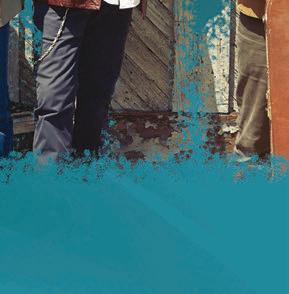
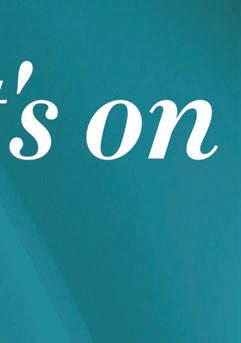
A selection of luxurious pieces from the Museum of Applied Arts' ceramics and glass collection is on display to introduce visitors to the traditions of hunting as part of the One with Nature World Hunting Exhibition. What makes the exhibition ‘On the Table’ special is that it does not show the artifacts needed to hunt game, but rather the tools of domestic culture, everyday life or even representation.
Originally a food gathering activity, hunting has been part of human culture, an important social activity and a means of social interaction for thousands of years. It is often a symbolic, ritual action and the subject of countless works of art.
Hunting was a privileged, even compulsory, pastime for the higher social classes - which gave rise to a number of highly representative objects on this theme. In particular, the exhibition focuses on luxury pieces that reflect the social status of the client or user. Faience, porcelain, hardware and glass tableware and ornaments, which are outstanding examples of 17th and 19th century ceramics, illustrate the theme and highlight the extent to which our culture is steeped in the ritual of hunting, trapping and eating game. mezogazdasagimuzeum.hu
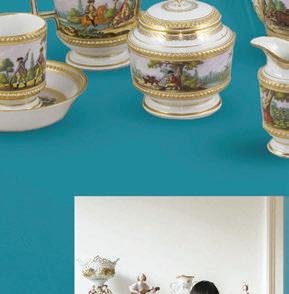

TOOL
MAY 24, 2022, BUDAPEST ARÉNA
Their last album, Fear Inoculum arrived in August of 2019, following years of anticipation. It debuted atop numerous country’s sales charts, shattering sales and radio records while also earning widespread critical praise. NME awarded Fear Inoculum a perfect five-stars and said it is "…so much more than just an album," The Guardian declared the release "a legacy album," Visions dubbed the 10-track collection "a perfect version of a TOOL record" and Kerrang! said "TOOL go beyond their own frontiers..."
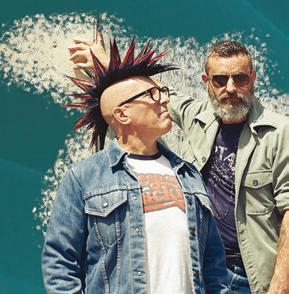
TOOL formed in 1990, releasing five studio albums: Undertow (1993), Ænima (1996), Lateralus (2001), 10,000 Days (2006), and Fear Inoculum (2019); two EPs: 72826 (1991) and Opiate (1992), and the limited-edition boxset Salival (2000).
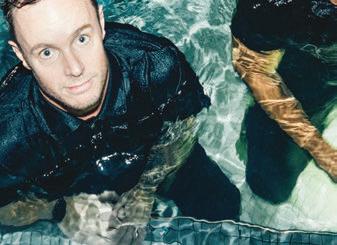
The band has won four GRAMMY Awards®: Best Metal Performance (1998, "Ænima"), Best Metal Performance (2002, “Schism”), Best Recording Package (2007, 10,000 Days) and Best Metal Performance (2020, "7empest").
TOOL is Danny Carey (drums), Justin Chancellor (bass), Adam Jones (guitar) and Maynard James Keenan (vocals). livenation.hu
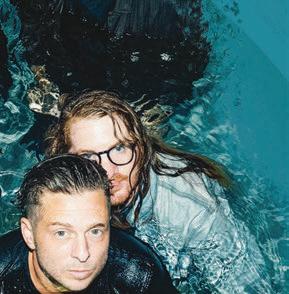
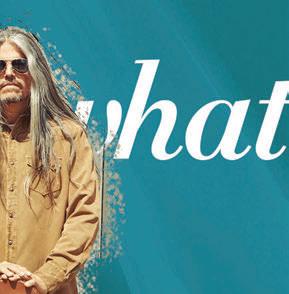

ONE REPUBLIC


MAY 13, 2022, BUDAPEST ARÉNA

IN
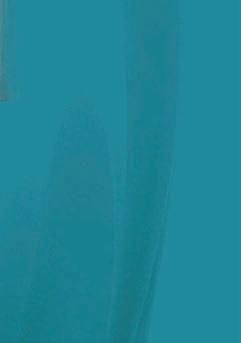

CIRCULATION:

ROMANI DESIGN FROM SEPTEMBER 24, GYÖRGY RÁTH VILLA, BUDAPEST

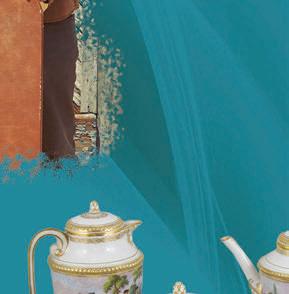
Romani Design is the world’s first Roma fashion studio. It is the mission of the sisters, Erika Varga and Helena Varga, who founded the studio in 2010, to help build the socio-cultural prestige of the Roma with the tools of fashion and applied arts. With their handmade design products, they place authentic Roma national dress into a contemporary context. In their collections, they are inclined to combine Roma and Hungarian folklore elements, as the two cultures have been integrally connected for centuries. From its beginnings, the Museum of Applied Arts has nurtured a close connection with the designers. We are proud that Romani Design held its very first fashion show in the main building of the museum (With Fashion for Acceptance, 2011). A part of the Spring/Summer 2017 collection, Wanderers of the Worlds, was acquired into the Contemporary Design Collection. In the story of the exhibition series, first the designers chose a total of six art objects from the collections of the museum. These are all devotional pictures depicting either the Virgin Mary or other female saints, which provided the inspiration for the designers to create six enchantingly richly patterned women’s garments and coordinated accessories. imm.hu
Grammy nominated OneRepublic, is comprised of singer/songwriter and lead vocalist Ryan Tedder, guitarists Zach Filkins and Drew Brown, bassist and cellist Brent Kutzle, keys Brian Willett and drummer Eddie Fisher. The band released their debut set Dreaming Out Loud in 2007. The release included the 20 million selling smash single Apologize, which shattered digital sales and airplay records worldwide and received a Grammy nomination. The band’s sophomore album, 2009’s Waking Up, produced the hit singles All The Right Moves, Secrets and Good Life. The certified-platinum album Native followed in 2013, featuring the No.1 hit and 41 million selling single Counting Stars as well as Love Runs Out, Feel Again and I Lose Myself. OneRepublic released Oh My My, their fourth full-length album in 2016 with songs Wherever I Go and Kids. OneRepublic’s latest, 5th studio album Human was released in August 2021. The album includes Run, Wanted, Didn’t I, Better Days, Someday and Rescue Me which combined have over 3 billion global streams. OneRepublic has amassed six billion streams on Spotify to date. The lead vocalist, Ryan Tedder is considered one of the most talented songwriters and producers of his generation, that’s also supported by his more than 30 top10 chart songs which in addition to OneRepublic are associated with the names of artists such as Adele, Taylor Swift, Beyoncé, Leona Lewis, Backstreet Boys, Jennifer Lopez, Demi Lovato, Maroon 5 or Ariana Grande. In 2015 OneRepublic had an amazing sold-out show in Budapest Arena, which remained memorable for fans and received dozens of enthusiastic reviews. livenation.hu
WORLD PRESS PHOTO EXHIBITION IN HUNGARY
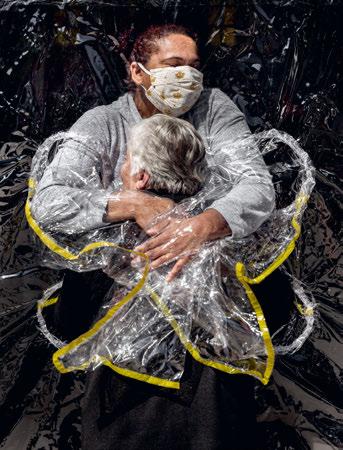
Selected by an independent jury from 74,470 photographs entered by 4,315 photographers from 130 countries, the World Press Photo Exhibition
2021 presents the winning images from the 64th annual Photo Contest. World Press
Photo welcomes the public for the fourth time at the Hungarian National Museum where 151 press photos are on display.
THE OVERALL WINNER
Rosa Luzia Lunardi, 85, is embraced by the nurse
Adriana Silva da Costa Souza at Viva Bem care home in São Paulo on August 5, 2020.
PHOTOGRAPH Mads Nissen/ Politiken/Panos Pictures
ENVIRONMENT
FIRST PRIZE, SINGLES | CALIFORNIA SEA LION PLAYS WITH MASK
A curious California sea lion swims towards a face mask at the Breakwater dive site in Monterey, California, on November 19, 2020. California sea lions (Zalophus californianus) are playful animals, native to western North America.
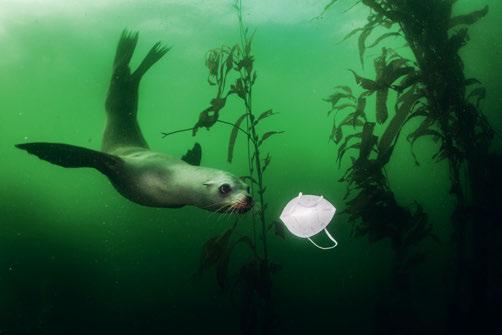
Ralph Pace
It is the world's most prestigious annual traveling photo exhibition, profiling the globe's top press photographers and showcasing the world's most provocative and poignant press photos, stories that make people stop, feel, think and act to a worldwide audience. Last year's theme was the coronavirus epidemic, which was prominent in all categories, the exhibition's organizer, Tamás Révész pointed out at the opening.
Dominated by pandemic themes
The organizer stressed that last year, as humanity worked together globally to combat the pandemic, photojournalists covered regional conflicts, social problems, natural beauty, environmental protection and sporting events, in addition to the pandemic. The selection also includes images of the conflict between Armenia and Azerbaijan and the warehouse explosion in Beirut that devastated the city. Digital Storytelling, the exhibition's companion program, provides the audience with important insights through its documentary films," he added. Judit Horgas, the editor of Liget magazine, pointed out that Hungarian poets, writers and essayists have contributed 21 works to the current WPP competition.
Health first
The organizers say that “while we aimed to extend and diversify our exhibition locations in 2020, the COVID-19 pandemic has badly
SPOT NEWS
FIRST PRIZE, SINGLES | EMANCIPATION MEMORIAL DEBATE
Anais, 26, who wants to remove the Emancipation statue in Lincoln Park in Washington DC, argues with a man who wants to keep it, on June 25, 2020. The drive to remove the statue comes amid a wave of calls to take down monuments of Confederate generals.

PHOTOGRAPH
Evelyn Hockstein for The Washington Post
impacted us and our partners, and many of the 125 locations planned this year were canceled or postponed. Together with our partners, the World Press Photo Foundation is closely monitoring health recommendations to continue bringing you the stories that matter while ensuring our community’s safety. his is a challenging time for the global community. In these difficult times, supporting the conditions that make visual journalism possible and sharing the work of visual journalists to a global audience is more important than ever.”
Authentic pictures and stories
It has become a tradition that an accompanying exhibition is linked at the Hungarian National Museum to the exhibition, which presents the often shocking entries. This year, the anniversary exhibition of the Sibiu Workshop presents the works of fifteen Hungarian photographers. “Our lives have been dominated by the epidemic in recent times. True, the summer months have made up for the isolation caused by the pandemic, but we are now looking around the world with concern: what kind of restrictions will the 4th wave bring us?
As mankind works together globally to fight the pandemic, photojournalists also report on other regional conflicts, social problems, natural beauty, environmental protection and sporting events. We desperately need authentic images and stories! These photos open a window on the world,” the organizers added. The exhibition, together with the documentary films of Digital Storytelling, provide important insights. It reveals stories and events that would otherwise go unnoticed by many, making the viewer pause, reflect, think and empathize. The travelling exhibition is viewed by more than four million people in 120 venues worldwide. Last year, the exhibition at the Hungarian National Museum was one of the most visited in the world – with more than 45,000 visitors annually in the years leading up to the epidemic.
"SHARING THE WORK OF VISUAL JOURNALISTS TO A GLOBAL AUDIENCE IS MORE IMPORTANT THAN EVER"PHOTOGRAPH
HUNGARY TRIUMPHS AT THE WORLD CHAMPIONSHIP OF WINE-TASTING

IT IS THE VERY FIRST TIME THAT HUNGARIANS BEAT THE REST OF THE WORLD IN BLIND TASTING
The Hungarian team emerged as the winner in the final the World Championship of Wine-Tasting at (Championnat du monde de dégustation
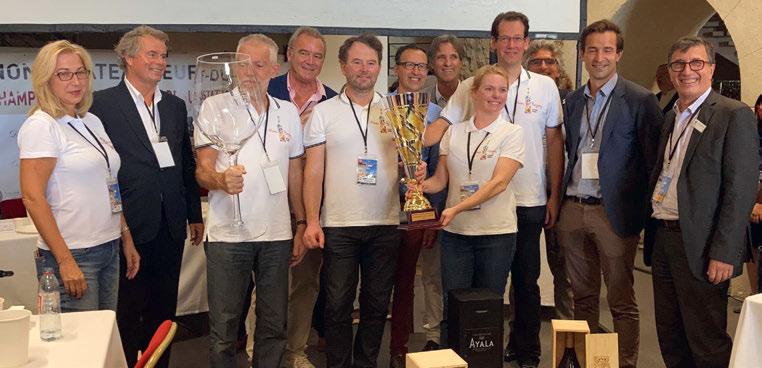
La RVF).
The Hungarians finished first in a fiercely competitive line-up featuring the best tasters of 27 nations including last year’s winner, the host country, France.
variety, the appellation, the vintage and the producer. Though the rules are easy to understand, the task was formidable. The competitors could not even see the bottles’ shapes and were not allowed to receive any kind of external assistance. It was like a university exam: no phones, no internet. All members of each team had to come to a common decision through careful analysis and discussion. The team able to identify the most categories received the highest score and was crowned the world champion. The task was made even more daunting by the fact that the wines might come from any corner of the world, their age may widely vary and, of course, can be made of any grape variety. This year, the wines to be identified included not just Old-World samples but also items from Argentina, Australia and South Africa.
12 points ahead of the world
The venue for this year’s final of the Championnat du Monde de Dégustation (‘World Championship of Wine-tasting’) was the Palais des Papes (‘Papal Palace’) in Avignon, France. The event draws an everincreasing crowd and in this year’s final, there were 27 national teams competing. The fourmember teams (that could include one foreign
national) were pitted against each other to show their competence, acumen and sensory talents. The list of competitors included the most prestigious wine producing nations like France, Italy, Spain, Portugal, the United States and South Africa. There were also some other countries present whose wine production is less significant but as importers they have developed
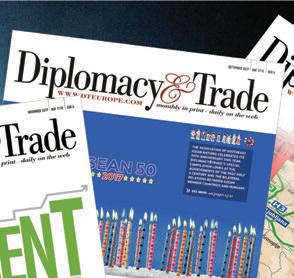

a profound understanding of wine like Japan, the United Kingdom, Sweden, Finland and Denmark. Among such illustrious rivals, the victory of the Hungarian team is a tremendous achievement.
A formidable task

During the competition, teams had to identify 12 wines by correctly stating the grape
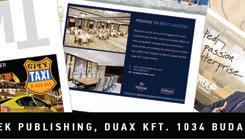
This year’s challenge seemed particularly tough. Following Round 6, the Hungarian team took the lead and from then on, never looked back. The runners-up were Belgium while Spain came third. With an overall score of 166 points, the Hungarian team finished 12 points ahead of the rest of the best wine-tasters in the world. Members of the winning team are Attila Aranyos (Captain), Laura Rabcsánszki, Dr. Levente Molnár and Didier Sanchez.
PAYMENT BANK TRANSFER
Account No: Unicredit Bank 10918001-00000106-89200006
Please, invoice me at the address: Date: Signature:






